Organizational Change Management
VerifiedAdded on 2023/06/03
|19
|6189
|366
AI Summary
The report discusses the concepts of business ethics and corporate social responsibility (CSR) and also the various benefits that the organizations can get through the effective utilization of these two concepts. For the purpose of this analysis, this report takes into consideration the case study “Leading an Ethical Business: Dilmah Tea”. The report begins by providing an overview of the organization. The report next discusses about the manner in which the concepts of quality products, use of business ethics and CSR has enabled the concerned organization in the case study to gain success in the business world of Sri Lanka over the years.
Contribute Materials
Your contribution can guide someone’s learning journey. Share your
documents today.
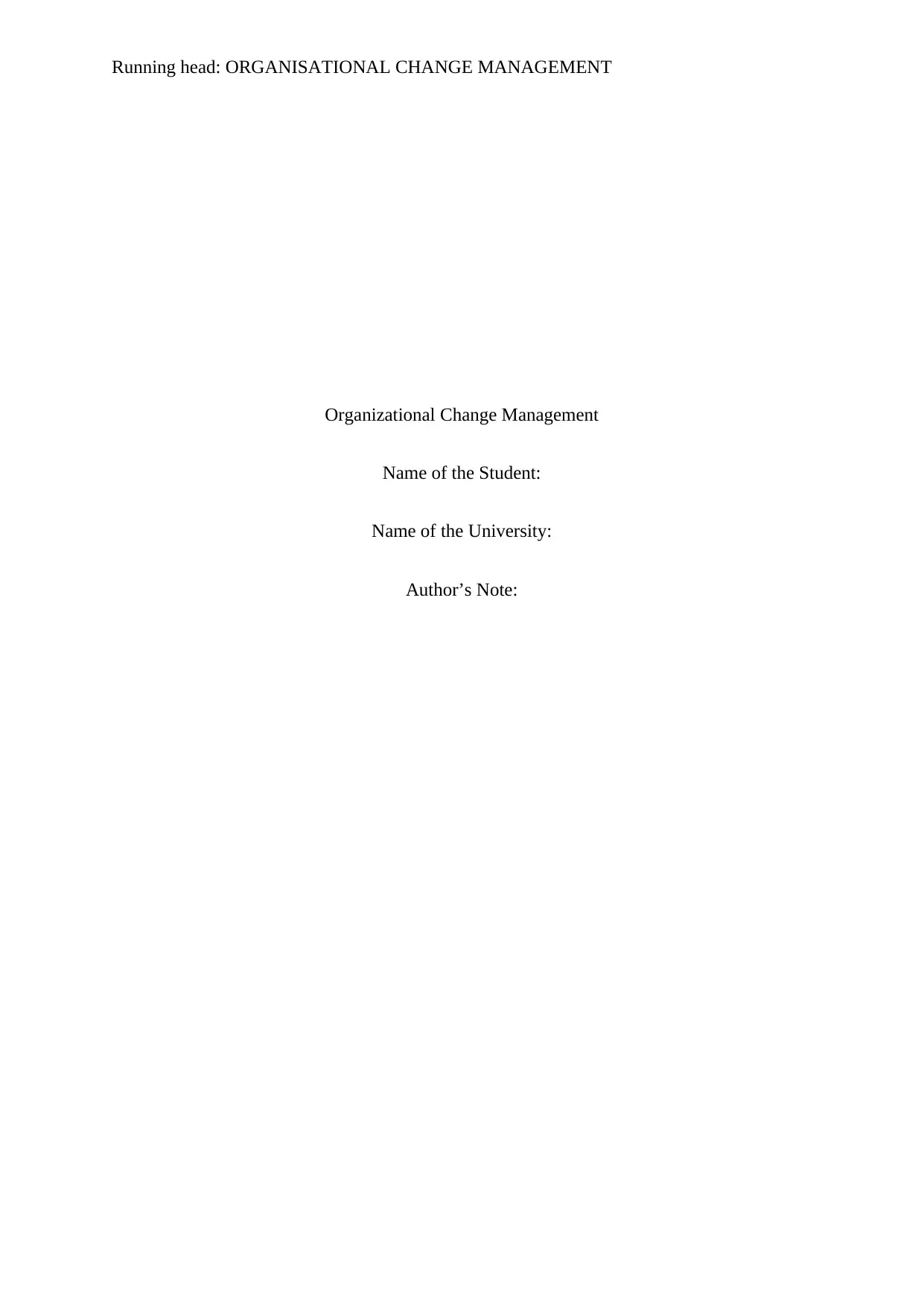
Running head: ORGANISATIONAL CHANGE MANAGEMENT
Organizational Change Management
Name of the Student:
Name of the University:
Author’s Note:
Organizational Change Management
Name of the Student:
Name of the University:
Author’s Note:
Secure Best Marks with AI Grader
Need help grading? Try our AI Grader for instant feedback on your assignments.
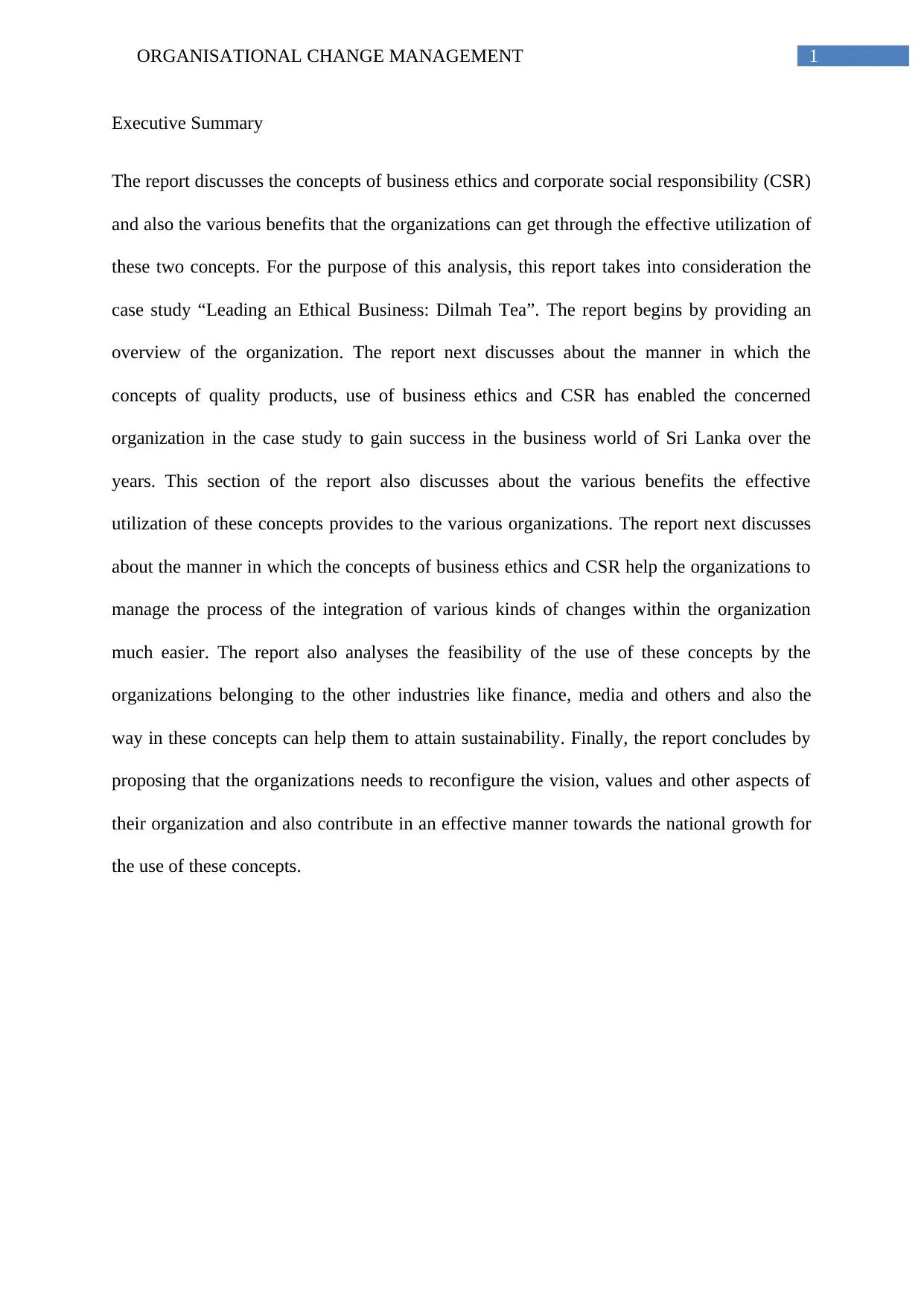
1ORGANISATIONAL CHANGE MANAGEMENT
Executive Summary
The report discusses the concepts of business ethics and corporate social responsibility (CSR)
and also the various benefits that the organizations can get through the effective utilization of
these two concepts. For the purpose of this analysis, this report takes into consideration the
case study “Leading an Ethical Business: Dilmah Tea”. The report begins by providing an
overview of the organization. The report next discusses about the manner in which the
concepts of quality products, use of business ethics and CSR has enabled the concerned
organization in the case study to gain success in the business world of Sri Lanka over the
years. This section of the report also discusses about the various benefits the effective
utilization of these concepts provides to the various organizations. The report next discusses
about the manner in which the concepts of business ethics and CSR help the organizations to
manage the process of the integration of various kinds of changes within the organization
much easier. The report also analyses the feasibility of the use of these concepts by the
organizations belonging to the other industries like finance, media and others and also the
way in these concepts can help them to attain sustainability. Finally, the report concludes by
proposing that the organizations needs to reconfigure the vision, values and other aspects of
their organization and also contribute in an effective manner towards the national growth for
the use of these concepts.
Executive Summary
The report discusses the concepts of business ethics and corporate social responsibility (CSR)
and also the various benefits that the organizations can get through the effective utilization of
these two concepts. For the purpose of this analysis, this report takes into consideration the
case study “Leading an Ethical Business: Dilmah Tea”. The report begins by providing an
overview of the organization. The report next discusses about the manner in which the
concepts of quality products, use of business ethics and CSR has enabled the concerned
organization in the case study to gain success in the business world of Sri Lanka over the
years. This section of the report also discusses about the various benefits the effective
utilization of these concepts provides to the various organizations. The report next discusses
about the manner in which the concepts of business ethics and CSR help the organizations to
manage the process of the integration of various kinds of changes within the organization
much easier. The report also analyses the feasibility of the use of these concepts by the
organizations belonging to the other industries like finance, media and others and also the
way in these concepts can help them to attain sustainability. Finally, the report concludes by
proposing that the organizations needs to reconfigure the vision, values and other aspects of
their organization and also contribute in an effective manner towards the national growth for
the use of these concepts.
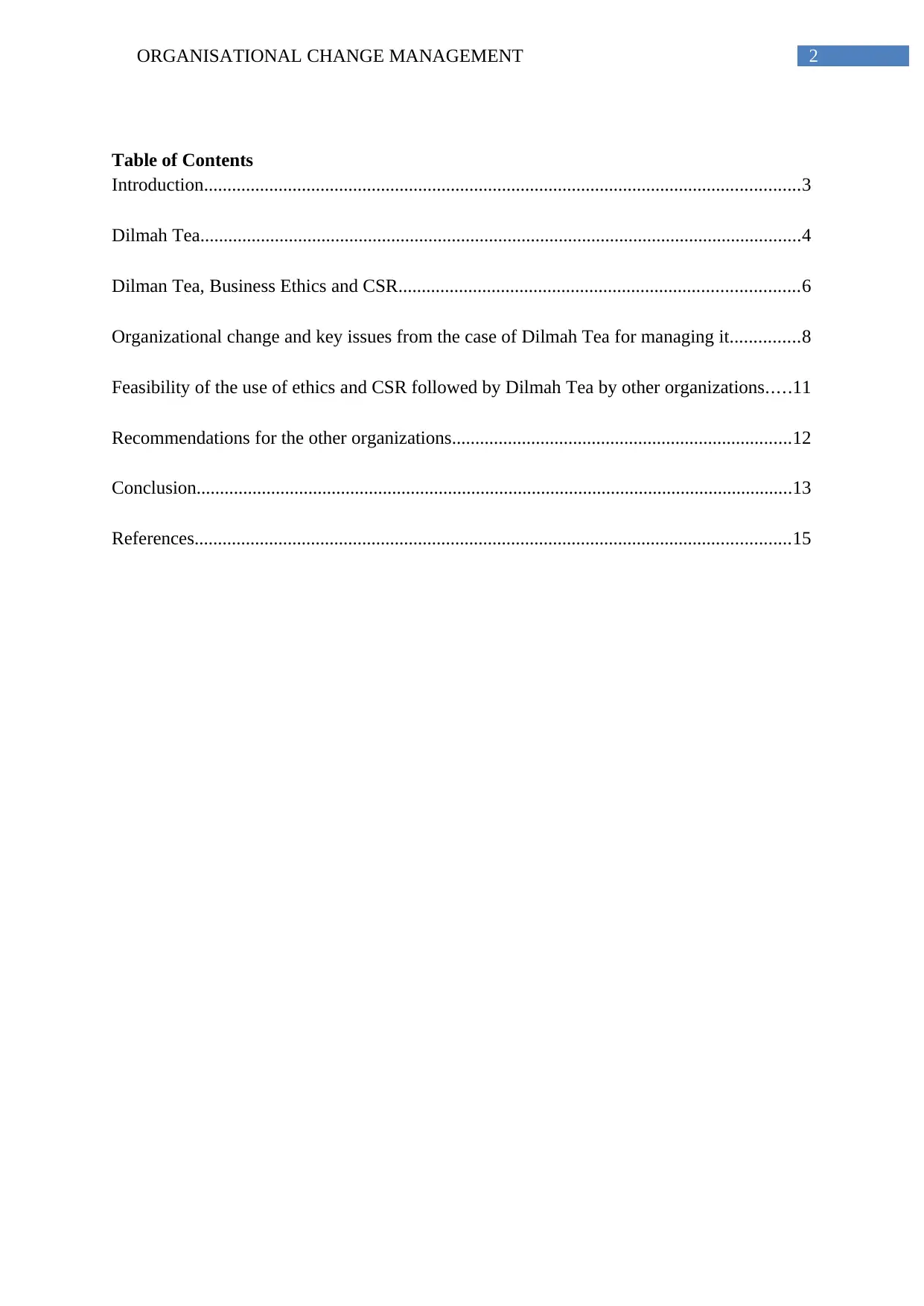
2ORGANISATIONAL CHANGE MANAGEMENT
Table of Contents
Introduction................................................................................................................................3
Dilmah Tea.................................................................................................................................4
Dilman Tea, Business Ethics and CSR......................................................................................6
Organizational change and key issues from the case of Dilmah Tea for managing it...............8
Feasibility of the use of ethics and CSR followed by Dilmah Tea by other organizations.....11
Recommendations for the other organizations.........................................................................12
Conclusion................................................................................................................................13
References................................................................................................................................15
Table of Contents
Introduction................................................................................................................................3
Dilmah Tea.................................................................................................................................4
Dilman Tea, Business Ethics and CSR......................................................................................6
Organizational change and key issues from the case of Dilmah Tea for managing it...............8
Feasibility of the use of ethics and CSR followed by Dilmah Tea by other organizations.....11
Recommendations for the other organizations.........................................................................12
Conclusion................................................................................................................................13
References................................................................................................................................15
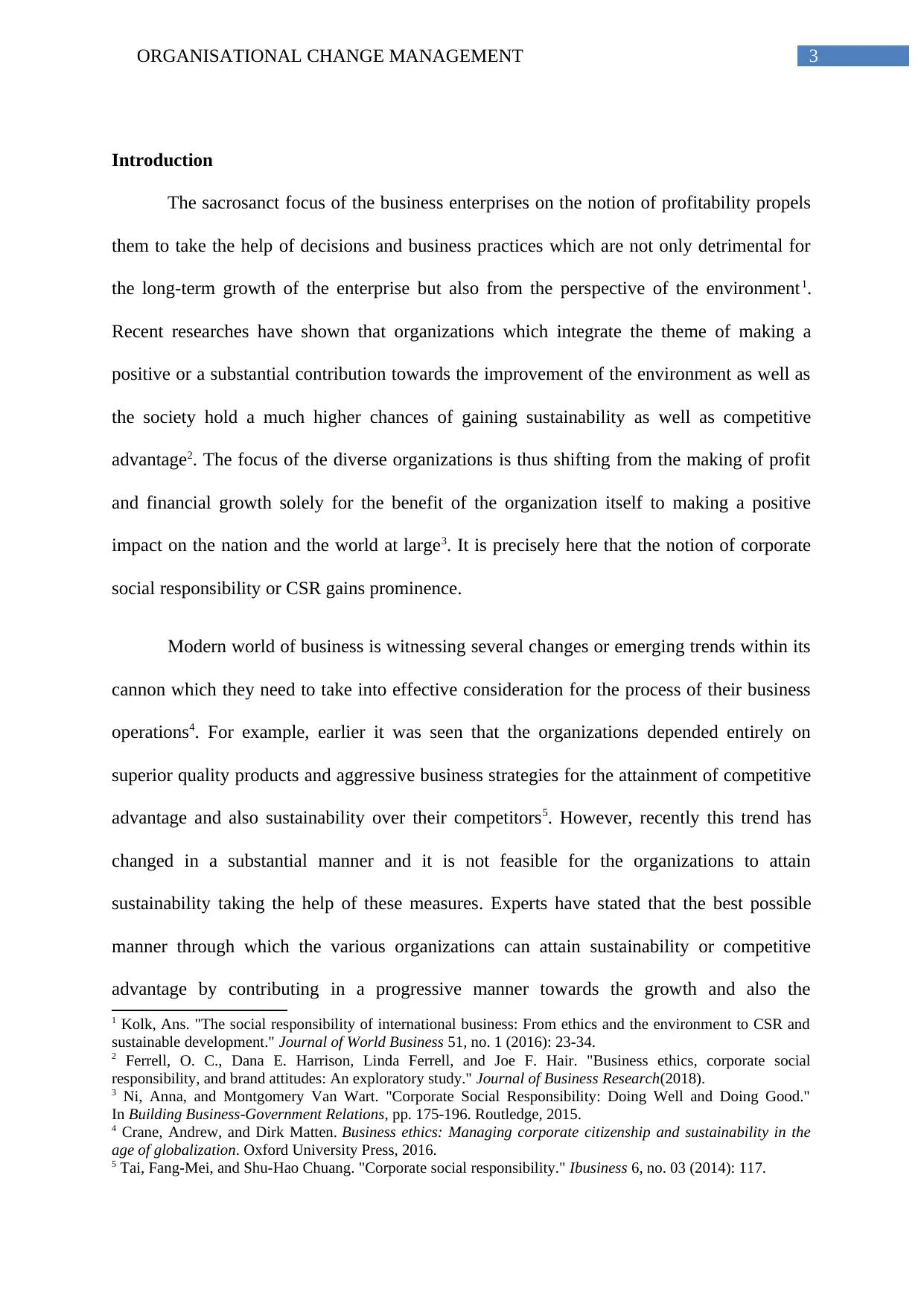
3ORGANISATIONAL CHANGE MANAGEMENT
Introduction
The sacrosanct focus of the business enterprises on the notion of profitability propels
them to take the help of decisions and business practices which are not only detrimental for
the long-term growth of the enterprise but also from the perspective of the environment1.
Recent researches have shown that organizations which integrate the theme of making a
positive or a substantial contribution towards the improvement of the environment as well as
the society hold a much higher chances of gaining sustainability as well as competitive
advantage2. The focus of the diverse organizations is thus shifting from the making of profit
and financial growth solely for the benefit of the organization itself to making a positive
impact on the nation and the world at large3. It is precisely here that the notion of corporate
social responsibility or CSR gains prominence.
Modern world of business is witnessing several changes or emerging trends within its
cannon which they need to take into effective consideration for the process of their business
operations4. For example, earlier it was seen that the organizations depended entirely on
superior quality products and aggressive business strategies for the attainment of competitive
advantage and also sustainability over their competitors5. However, recently this trend has
changed in a substantial manner and it is not feasible for the organizations to attain
sustainability taking the help of these measures. Experts have stated that the best possible
manner through which the various organizations can attain sustainability or competitive
advantage by contributing in a progressive manner towards the growth and also the
1 Kolk, Ans. "The social responsibility of international business: From ethics and the environment to CSR and
sustainable development." Journal of World Business 51, no. 1 (2016): 23-34.
2 Ferrell, O. C., Dana E. Harrison, Linda Ferrell, and Joe F. Hair. "Business ethics, corporate social
responsibility, and brand attitudes: An exploratory study." Journal of Business Research(2018).
3 Ni, Anna, and Montgomery Van Wart. "Corporate Social Responsibility: Doing Well and Doing Good."
In Building Business-Government Relations, pp. 175-196. Routledge, 2015.
4 Crane, Andrew, and Dirk Matten. Business ethics: Managing corporate citizenship and sustainability in the
age of globalization. Oxford University Press, 2016.
5 Tai, Fang-Mei, and Shu-Hao Chuang. "Corporate social responsibility." Ibusiness 6, no. 03 (2014): 117.
Introduction
The sacrosanct focus of the business enterprises on the notion of profitability propels
them to take the help of decisions and business practices which are not only detrimental for
the long-term growth of the enterprise but also from the perspective of the environment1.
Recent researches have shown that organizations which integrate the theme of making a
positive or a substantial contribution towards the improvement of the environment as well as
the society hold a much higher chances of gaining sustainability as well as competitive
advantage2. The focus of the diverse organizations is thus shifting from the making of profit
and financial growth solely for the benefit of the organization itself to making a positive
impact on the nation and the world at large3. It is precisely here that the notion of corporate
social responsibility or CSR gains prominence.
Modern world of business is witnessing several changes or emerging trends within its
cannon which they need to take into effective consideration for the process of their business
operations4. For example, earlier it was seen that the organizations depended entirely on
superior quality products and aggressive business strategies for the attainment of competitive
advantage and also sustainability over their competitors5. However, recently this trend has
changed in a substantial manner and it is not feasible for the organizations to attain
sustainability taking the help of these measures. Experts have stated that the best possible
manner through which the various organizations can attain sustainability or competitive
advantage by contributing in a progressive manner towards the growth and also the
1 Kolk, Ans. "The social responsibility of international business: From ethics and the environment to CSR and
sustainable development." Journal of World Business 51, no. 1 (2016): 23-34.
2 Ferrell, O. C., Dana E. Harrison, Linda Ferrell, and Joe F. Hair. "Business ethics, corporate social
responsibility, and brand attitudes: An exploratory study." Journal of Business Research(2018).
3 Ni, Anna, and Montgomery Van Wart. "Corporate Social Responsibility: Doing Well and Doing Good."
In Building Business-Government Relations, pp. 175-196. Routledge, 2015.
4 Crane, Andrew, and Dirk Matten. Business ethics: Managing corporate citizenship and sustainability in the
age of globalization. Oxford University Press, 2016.
5 Tai, Fang-Mei, and Shu-Hao Chuang. "Corporate social responsibility." Ibusiness 6, no. 03 (2014): 117.
Secure Best Marks with AI Grader
Need help grading? Try our AI Grader for instant feedback on your assignments.
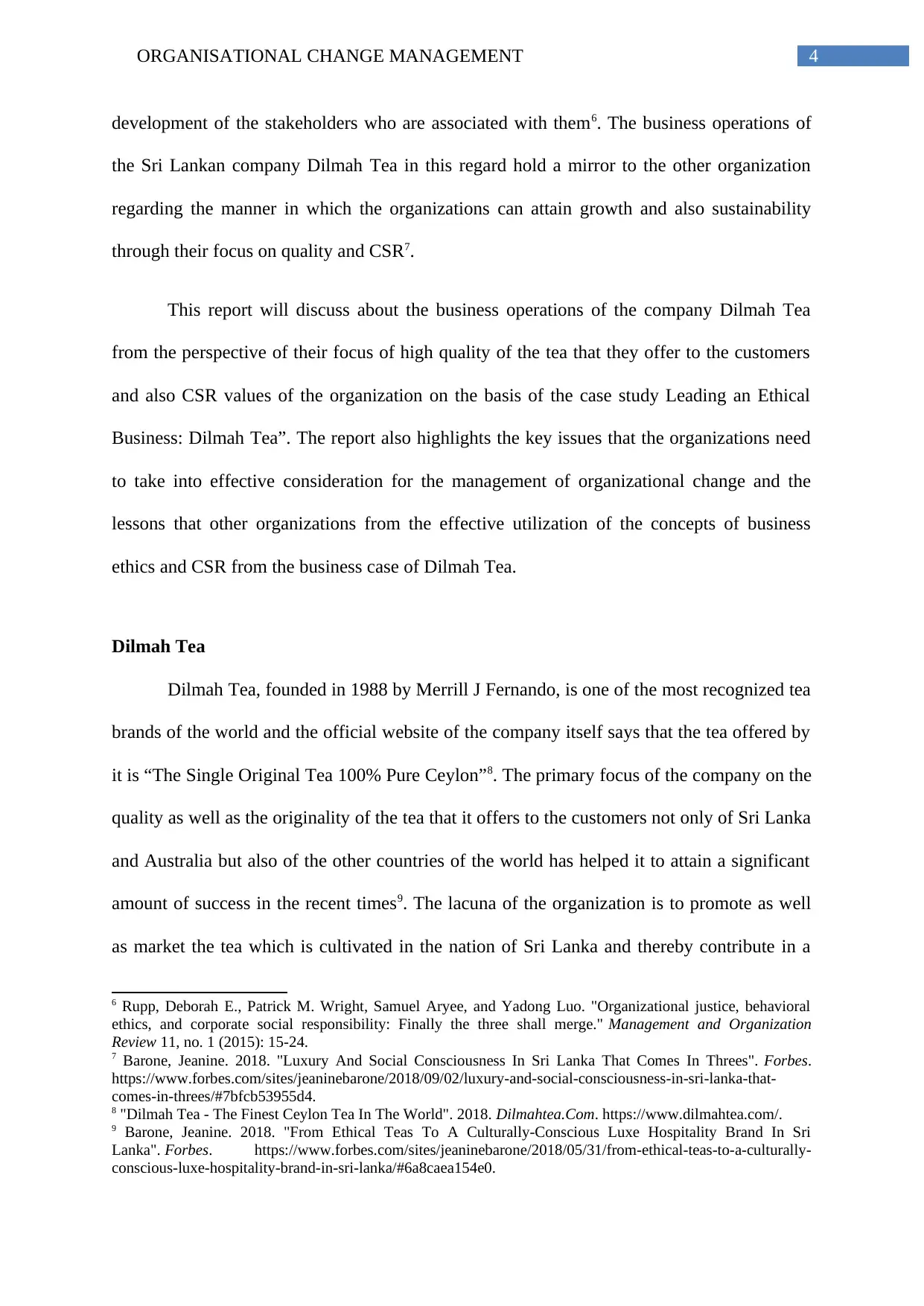
4ORGANISATIONAL CHANGE MANAGEMENT
development of the stakeholders who are associated with them6. The business operations of
the Sri Lankan company Dilmah Tea in this regard hold a mirror to the other organization
regarding the manner in which the organizations can attain growth and also sustainability
through their focus on quality and CSR7.
This report will discuss about the business operations of the company Dilmah Tea
from the perspective of their focus of high quality of the tea that they offer to the customers
and also CSR values of the organization on the basis of the case study Leading an Ethical
Business: Dilmah Tea”. The report also highlights the key issues that the organizations need
to take into effective consideration for the management of organizational change and the
lessons that other organizations from the effective utilization of the concepts of business
ethics and CSR from the business case of Dilmah Tea.
Dilmah Tea
Dilmah Tea, founded in 1988 by Merrill J Fernando, is one of the most recognized tea
brands of the world and the official website of the company itself says that the tea offered by
it is “The Single Original Tea 100% Pure Ceylon”8. The primary focus of the company on the
quality as well as the originality of the tea that it offers to the customers not only of Sri Lanka
and Australia but also of the other countries of the world has helped it to attain a significant
amount of success in the recent times9. The lacuna of the organization is to promote as well
as market the tea which is cultivated in the nation of Sri Lanka and thereby contribute in a
6 Rupp, Deborah E., Patrick M. Wright, Samuel Aryee, and Yadong Luo. "Organizational justice, behavioral
ethics, and corporate social responsibility: Finally the three shall merge." Management and Organization
Review 11, no. 1 (2015): 15-24.
7 Barone, Jeanine. 2018. "Luxury And Social Consciousness In Sri Lanka That Comes In Threes". Forbes.
https://www.forbes.com/sites/jeaninebarone/2018/09/02/luxury-and-social-consciousness-in-sri-lanka-that-
comes-in-threes/#7bfcb53955d4.
8 "Dilmah Tea - The Finest Ceylon Tea In The World". 2018. Dilmahtea.Com. https://www.dilmahtea.com/.
9 Barone, Jeanine. 2018. "From Ethical Teas To A Culturally-Conscious Luxe Hospitality Brand In Sri
Lanka". Forbes. https://www.forbes.com/sites/jeaninebarone/2018/05/31/from-ethical-teas-to-a-culturally-
conscious-luxe-hospitality-brand-in-sri-lanka/#6a8caea154e0.
development of the stakeholders who are associated with them6. The business operations of
the Sri Lankan company Dilmah Tea in this regard hold a mirror to the other organization
regarding the manner in which the organizations can attain growth and also sustainability
through their focus on quality and CSR7.
This report will discuss about the business operations of the company Dilmah Tea
from the perspective of their focus of high quality of the tea that they offer to the customers
and also CSR values of the organization on the basis of the case study Leading an Ethical
Business: Dilmah Tea”. The report also highlights the key issues that the organizations need
to take into effective consideration for the management of organizational change and the
lessons that other organizations from the effective utilization of the concepts of business
ethics and CSR from the business case of Dilmah Tea.
Dilmah Tea
Dilmah Tea, founded in 1988 by Merrill J Fernando, is one of the most recognized tea
brands of the world and the official website of the company itself says that the tea offered by
it is “The Single Original Tea 100% Pure Ceylon”8. The primary focus of the company on the
quality as well as the originality of the tea that it offers to the customers not only of Sri Lanka
and Australia but also of the other countries of the world has helped it to attain a significant
amount of success in the recent times9. The lacuna of the organization is to promote as well
as market the tea which is cultivated in the nation of Sri Lanka and thereby contribute in a
6 Rupp, Deborah E., Patrick M. Wright, Samuel Aryee, and Yadong Luo. "Organizational justice, behavioral
ethics, and corporate social responsibility: Finally the three shall merge." Management and Organization
Review 11, no. 1 (2015): 15-24.
7 Barone, Jeanine. 2018. "Luxury And Social Consciousness In Sri Lanka That Comes In Threes". Forbes.
https://www.forbes.com/sites/jeaninebarone/2018/09/02/luxury-and-social-consciousness-in-sri-lanka-that-
comes-in-threes/#7bfcb53955d4.
8 "Dilmah Tea - The Finest Ceylon Tea In The World". 2018. Dilmahtea.Com. https://www.dilmahtea.com/.
9 Barone, Jeanine. 2018. "From Ethical Teas To A Culturally-Conscious Luxe Hospitality Brand In Sri
Lanka". Forbes. https://www.forbes.com/sites/jeaninebarone/2018/05/31/from-ethical-teas-to-a-culturally-
conscious-luxe-hospitality-brand-in-sri-lanka/#6a8caea154e0.
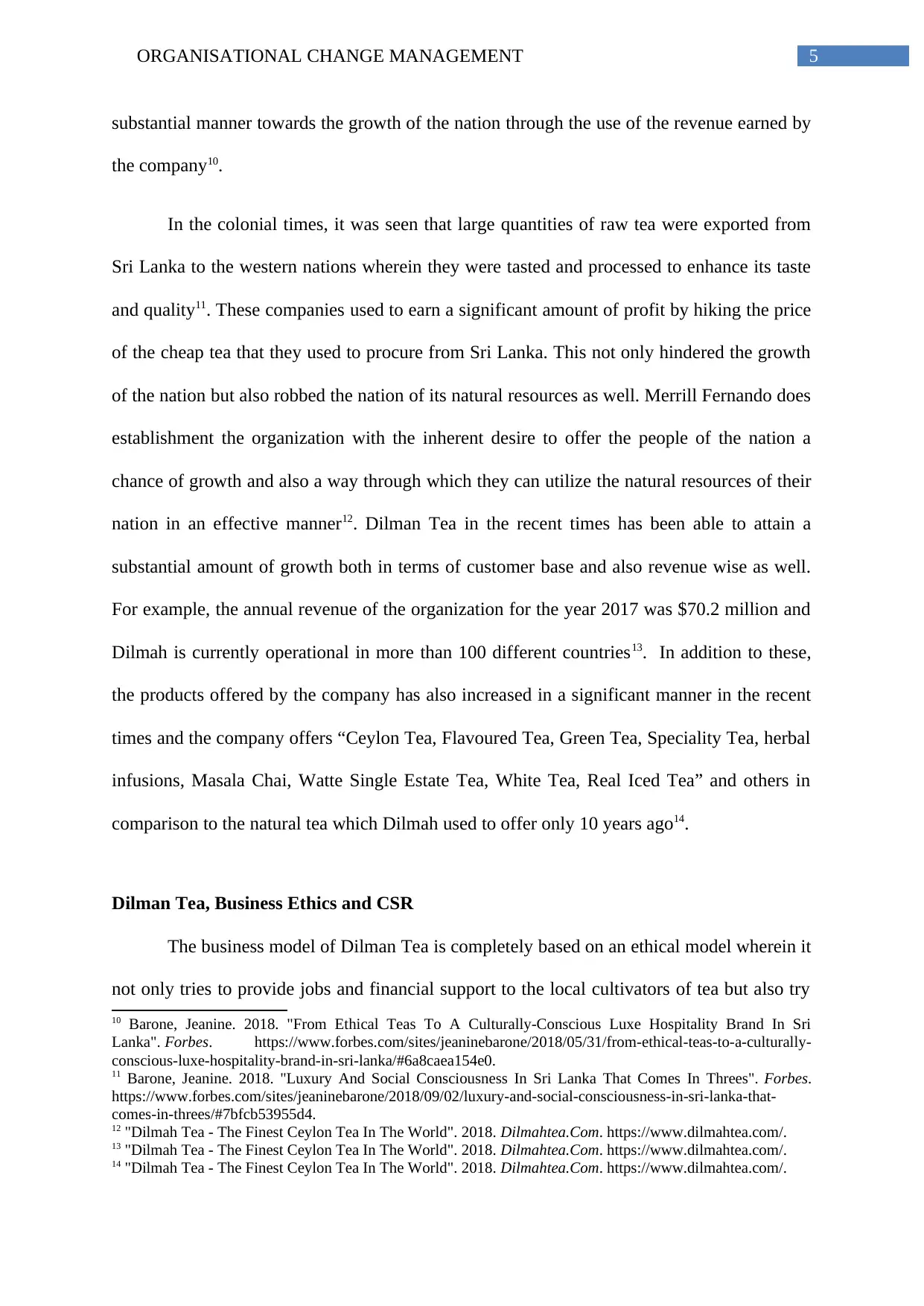
5ORGANISATIONAL CHANGE MANAGEMENT
substantial manner towards the growth of the nation through the use of the revenue earned by
the company10.
In the colonial times, it was seen that large quantities of raw tea were exported from
Sri Lanka to the western nations wherein they were tasted and processed to enhance its taste
and quality11. These companies used to earn a significant amount of profit by hiking the price
of the cheap tea that they used to procure from Sri Lanka. This not only hindered the growth
of the nation but also robbed the nation of its natural resources as well. Merrill Fernando does
establishment the organization with the inherent desire to offer the people of the nation a
chance of growth and also a way through which they can utilize the natural resources of their
nation in an effective manner12. Dilman Tea in the recent times has been able to attain a
substantial amount of growth both in terms of customer base and also revenue wise as well.
For example, the annual revenue of the organization for the year 2017 was $70.2 million and
Dilmah is currently operational in more than 100 different countries13. In addition to these,
the products offered by the company has also increased in a significant manner in the recent
times and the company offers “Ceylon Tea, Flavoured Tea, Green Tea, Speciality Tea, herbal
infusions, Masala Chai, Watte Single Estate Tea, White Tea, Real Iced Tea” and others in
comparison to the natural tea which Dilmah used to offer only 10 years ago14.
Dilman Tea, Business Ethics and CSR
The business model of Dilman Tea is completely based on an ethical model wherein it
not only tries to provide jobs and financial support to the local cultivators of tea but also try
10 Barone, Jeanine. 2018. "From Ethical Teas To A Culturally-Conscious Luxe Hospitality Brand In Sri
Lanka". Forbes. https://www.forbes.com/sites/jeaninebarone/2018/05/31/from-ethical-teas-to-a-culturally-
conscious-luxe-hospitality-brand-in-sri-lanka/#6a8caea154e0.
11 Barone, Jeanine. 2018. "Luxury And Social Consciousness In Sri Lanka That Comes In Threes". Forbes.
https://www.forbes.com/sites/jeaninebarone/2018/09/02/luxury-and-social-consciousness-in-sri-lanka-that-
comes-in-threes/#7bfcb53955d4.
12 "Dilmah Tea - The Finest Ceylon Tea In The World". 2018. Dilmahtea.Com. https://www.dilmahtea.com/.
13 "Dilmah Tea - The Finest Ceylon Tea In The World". 2018. Dilmahtea.Com. https://www.dilmahtea.com/.
14 "Dilmah Tea - The Finest Ceylon Tea In The World". 2018. Dilmahtea.Com. https://www.dilmahtea.com/.
substantial manner towards the growth of the nation through the use of the revenue earned by
the company10.
In the colonial times, it was seen that large quantities of raw tea were exported from
Sri Lanka to the western nations wherein they were tasted and processed to enhance its taste
and quality11. These companies used to earn a significant amount of profit by hiking the price
of the cheap tea that they used to procure from Sri Lanka. This not only hindered the growth
of the nation but also robbed the nation of its natural resources as well. Merrill Fernando does
establishment the organization with the inherent desire to offer the people of the nation a
chance of growth and also a way through which they can utilize the natural resources of their
nation in an effective manner12. Dilman Tea in the recent times has been able to attain a
substantial amount of growth both in terms of customer base and also revenue wise as well.
For example, the annual revenue of the organization for the year 2017 was $70.2 million and
Dilmah is currently operational in more than 100 different countries13. In addition to these,
the products offered by the company has also increased in a significant manner in the recent
times and the company offers “Ceylon Tea, Flavoured Tea, Green Tea, Speciality Tea, herbal
infusions, Masala Chai, Watte Single Estate Tea, White Tea, Real Iced Tea” and others in
comparison to the natural tea which Dilmah used to offer only 10 years ago14.
Dilman Tea, Business Ethics and CSR
The business model of Dilman Tea is completely based on an ethical model wherein it
not only tries to provide jobs and financial support to the local cultivators of tea but also try
10 Barone, Jeanine. 2018. "From Ethical Teas To A Culturally-Conscious Luxe Hospitality Brand In Sri
Lanka". Forbes. https://www.forbes.com/sites/jeaninebarone/2018/05/31/from-ethical-teas-to-a-culturally-
conscious-luxe-hospitality-brand-in-sri-lanka/#6a8caea154e0.
11 Barone, Jeanine. 2018. "Luxury And Social Consciousness In Sri Lanka That Comes In Threes". Forbes.
https://www.forbes.com/sites/jeaninebarone/2018/09/02/luxury-and-social-consciousness-in-sri-lanka-that-
comes-in-threes/#7bfcb53955d4.
12 "Dilmah Tea - The Finest Ceylon Tea In The World". 2018. Dilmahtea.Com. https://www.dilmahtea.com/.
13 "Dilmah Tea - The Finest Ceylon Tea In The World". 2018. Dilmahtea.Com. https://www.dilmahtea.com/.
14 "Dilmah Tea - The Finest Ceylon Tea In The World". 2018. Dilmahtea.Com. https://www.dilmahtea.com/.
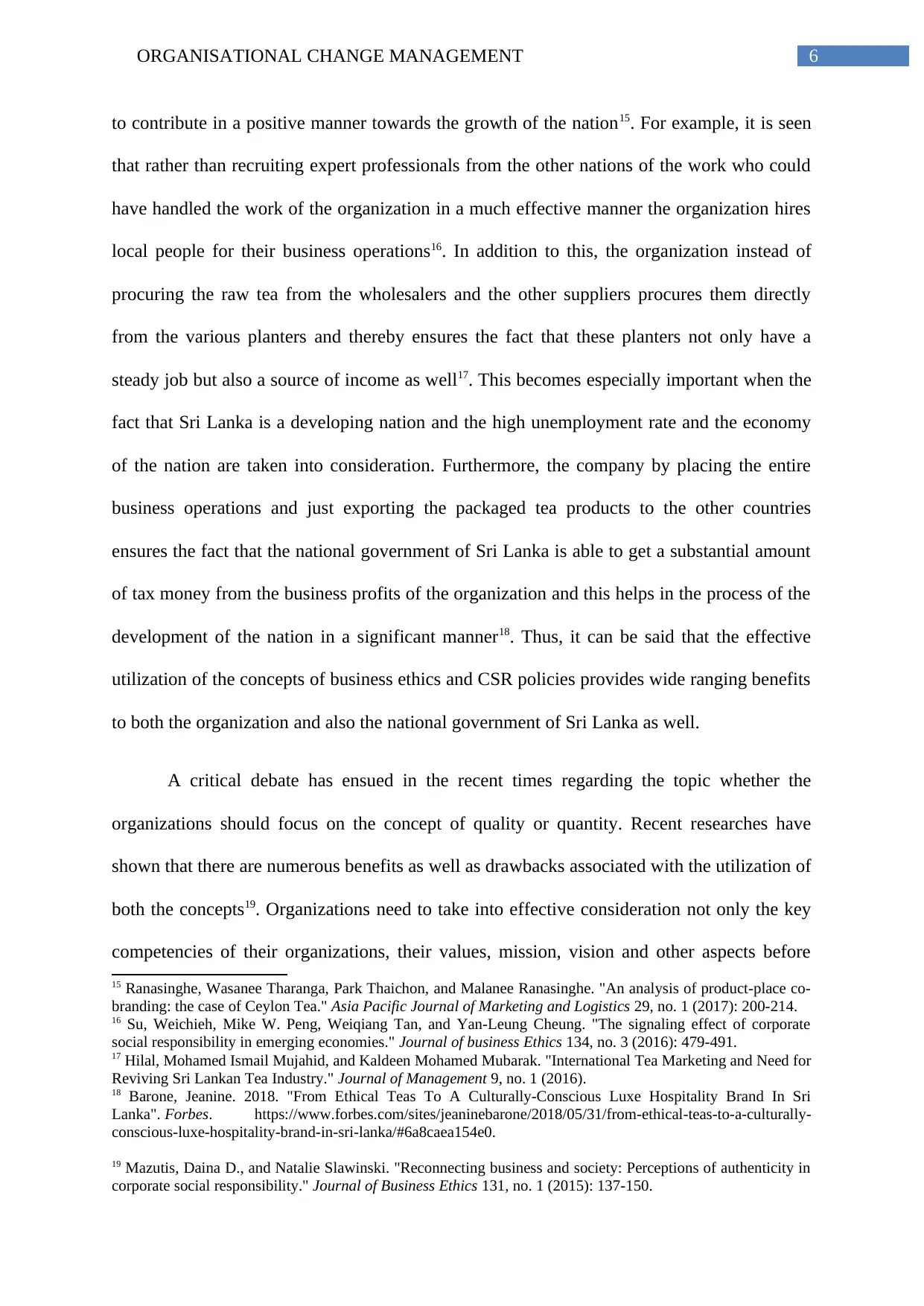
6ORGANISATIONAL CHANGE MANAGEMENT
to contribute in a positive manner towards the growth of the nation15. For example, it is seen
that rather than recruiting expert professionals from the other nations of the work who could
have handled the work of the organization in a much effective manner the organization hires
local people for their business operations16. In addition to this, the organization instead of
procuring the raw tea from the wholesalers and the other suppliers procures them directly
from the various planters and thereby ensures the fact that these planters not only have a
steady job but also a source of income as well17. This becomes especially important when the
fact that Sri Lanka is a developing nation and the high unemployment rate and the economy
of the nation are taken into consideration. Furthermore, the company by placing the entire
business operations and just exporting the packaged tea products to the other countries
ensures the fact that the national government of Sri Lanka is able to get a substantial amount
of tax money from the business profits of the organization and this helps in the process of the
development of the nation in a significant manner18. Thus, it can be said that the effective
utilization of the concepts of business ethics and CSR policies provides wide ranging benefits
to both the organization and also the national government of Sri Lanka as well.
A critical debate has ensued in the recent times regarding the topic whether the
organizations should focus on the concept of quality or quantity. Recent researches have
shown that there are numerous benefits as well as drawbacks associated with the utilization of
both the concepts19. Organizations need to take into effective consideration not only the key
competencies of their organizations, their values, mission, vision and other aspects before
15 Ranasinghe, Wasanee Tharanga, Park Thaichon, and Malanee Ranasinghe. "An analysis of product-place co-
branding: the case of Ceylon Tea." Asia Pacific Journal of Marketing and Logistics 29, no. 1 (2017): 200-214.
16 Su, Weichieh, Mike W. Peng, Weiqiang Tan, and Yan-Leung Cheung. "The signaling effect of corporate
social responsibility in emerging economies." Journal of business Ethics 134, no. 3 (2016): 479-491.
17 Hilal, Mohamed Ismail Mujahid, and Kaldeen Mohamed Mubarak. "International Tea Marketing and Need for
Reviving Sri Lankan Tea Industry." Journal of Management 9, no. 1 (2016).
18 Barone, Jeanine. 2018. "From Ethical Teas To A Culturally-Conscious Luxe Hospitality Brand In Sri
Lanka". Forbes. https://www.forbes.com/sites/jeaninebarone/2018/05/31/from-ethical-teas-to-a-culturally-
conscious-luxe-hospitality-brand-in-sri-lanka/#6a8caea154e0.
19 Mazutis, Daina D., and Natalie Slawinski. "Reconnecting business and society: Perceptions of authenticity in
corporate social responsibility." Journal of Business Ethics 131, no. 1 (2015): 137-150.
to contribute in a positive manner towards the growth of the nation15. For example, it is seen
that rather than recruiting expert professionals from the other nations of the work who could
have handled the work of the organization in a much effective manner the organization hires
local people for their business operations16. In addition to this, the organization instead of
procuring the raw tea from the wholesalers and the other suppliers procures them directly
from the various planters and thereby ensures the fact that these planters not only have a
steady job but also a source of income as well17. This becomes especially important when the
fact that Sri Lanka is a developing nation and the high unemployment rate and the economy
of the nation are taken into consideration. Furthermore, the company by placing the entire
business operations and just exporting the packaged tea products to the other countries
ensures the fact that the national government of Sri Lanka is able to get a substantial amount
of tax money from the business profits of the organization and this helps in the process of the
development of the nation in a significant manner18. Thus, it can be said that the effective
utilization of the concepts of business ethics and CSR policies provides wide ranging benefits
to both the organization and also the national government of Sri Lanka as well.
A critical debate has ensued in the recent times regarding the topic whether the
organizations should focus on the concept of quality or quantity. Recent researches have
shown that there are numerous benefits as well as drawbacks associated with the utilization of
both the concepts19. Organizations need to take into effective consideration not only the key
competencies of their organizations, their values, mission, vision and other aspects before
15 Ranasinghe, Wasanee Tharanga, Park Thaichon, and Malanee Ranasinghe. "An analysis of product-place co-
branding: the case of Ceylon Tea." Asia Pacific Journal of Marketing and Logistics 29, no. 1 (2017): 200-214.
16 Su, Weichieh, Mike W. Peng, Weiqiang Tan, and Yan-Leung Cheung. "The signaling effect of corporate
social responsibility in emerging economies." Journal of business Ethics 134, no. 3 (2016): 479-491.
17 Hilal, Mohamed Ismail Mujahid, and Kaldeen Mohamed Mubarak. "International Tea Marketing and Need for
Reviving Sri Lankan Tea Industry." Journal of Management 9, no. 1 (2016).
18 Barone, Jeanine. 2018. "From Ethical Teas To A Culturally-Conscious Luxe Hospitality Brand In Sri
Lanka". Forbes. https://www.forbes.com/sites/jeaninebarone/2018/05/31/from-ethical-teas-to-a-culturally-
conscious-luxe-hospitality-brand-in-sri-lanka/#6a8caea154e0.
19 Mazutis, Daina D., and Natalie Slawinski. "Reconnecting business and society: Perceptions of authenticity in
corporate social responsibility." Journal of Business Ethics 131, no. 1 (2015): 137-150.
Paraphrase This Document
Need a fresh take? Get an instant paraphrase of this document with our AI Paraphraser
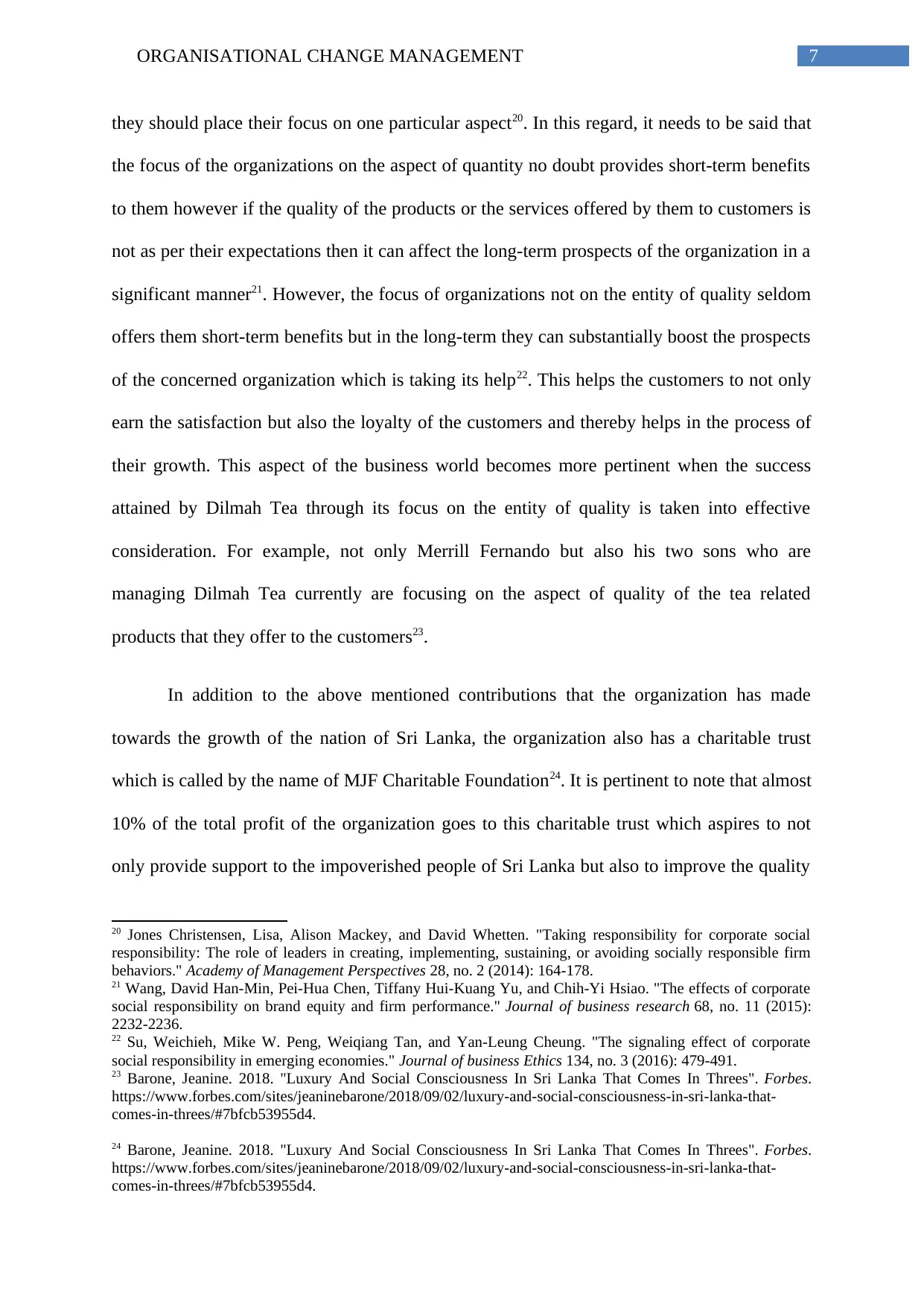
7ORGANISATIONAL CHANGE MANAGEMENT
they should place their focus on one particular aspect20. In this regard, it needs to be said that
the focus of the organizations on the aspect of quantity no doubt provides short-term benefits
to them however if the quality of the products or the services offered by them to customers is
not as per their expectations then it can affect the long-term prospects of the organization in a
significant manner21. However, the focus of organizations not on the entity of quality seldom
offers them short-term benefits but in the long-term they can substantially boost the prospects
of the concerned organization which is taking its help22. This helps the customers to not only
earn the satisfaction but also the loyalty of the customers and thereby helps in the process of
their growth. This aspect of the business world becomes more pertinent when the success
attained by Dilmah Tea through its focus on the entity of quality is taken into effective
consideration. For example, not only Merrill Fernando but also his two sons who are
managing Dilmah Tea currently are focusing on the aspect of quality of the tea related
products that they offer to the customers23.
In addition to the above mentioned contributions that the organization has made
towards the growth of the nation of Sri Lanka, the organization also has a charitable trust
which is called by the name of MJF Charitable Foundation24. It is pertinent to note that almost
10% of the total profit of the organization goes to this charitable trust which aspires to not
only provide support to the impoverished people of Sri Lanka but also to improve the quality
20 Jones Christensen, Lisa, Alison Mackey, and David Whetten. "Taking responsibility for corporate social
responsibility: The role of leaders in creating, implementing, sustaining, or avoiding socially responsible firm
behaviors." Academy of Management Perspectives 28, no. 2 (2014): 164-178.
21 Wang, David Han-Min, Pei-Hua Chen, Tiffany Hui-Kuang Yu, and Chih-Yi Hsiao. "The effects of corporate
social responsibility on brand equity and firm performance." Journal of business research 68, no. 11 (2015):
2232-2236.
22 Su, Weichieh, Mike W. Peng, Weiqiang Tan, and Yan-Leung Cheung. "The signaling effect of corporate
social responsibility in emerging economies." Journal of business Ethics 134, no. 3 (2016): 479-491.
23 Barone, Jeanine. 2018. "Luxury And Social Consciousness In Sri Lanka That Comes In Threes". Forbes.
https://www.forbes.com/sites/jeaninebarone/2018/09/02/luxury-and-social-consciousness-in-sri-lanka-that-
comes-in-threes/#7bfcb53955d4.
24 Barone, Jeanine. 2018. "Luxury And Social Consciousness In Sri Lanka That Comes In Threes". Forbes.
https://www.forbes.com/sites/jeaninebarone/2018/09/02/luxury-and-social-consciousness-in-sri-lanka-that-
comes-in-threes/#7bfcb53955d4.
they should place their focus on one particular aspect20. In this regard, it needs to be said that
the focus of the organizations on the aspect of quantity no doubt provides short-term benefits
to them however if the quality of the products or the services offered by them to customers is
not as per their expectations then it can affect the long-term prospects of the organization in a
significant manner21. However, the focus of organizations not on the entity of quality seldom
offers them short-term benefits but in the long-term they can substantially boost the prospects
of the concerned organization which is taking its help22. This helps the customers to not only
earn the satisfaction but also the loyalty of the customers and thereby helps in the process of
their growth. This aspect of the business world becomes more pertinent when the success
attained by Dilmah Tea through its focus on the entity of quality is taken into effective
consideration. For example, not only Merrill Fernando but also his two sons who are
managing Dilmah Tea currently are focusing on the aspect of quality of the tea related
products that they offer to the customers23.
In addition to the above mentioned contributions that the organization has made
towards the growth of the nation of Sri Lanka, the organization also has a charitable trust
which is called by the name of MJF Charitable Foundation24. It is pertinent to note that almost
10% of the total profit of the organization goes to this charitable trust which aspires to not
only provide support to the impoverished people of Sri Lanka but also to improve the quality
20 Jones Christensen, Lisa, Alison Mackey, and David Whetten. "Taking responsibility for corporate social
responsibility: The role of leaders in creating, implementing, sustaining, or avoiding socially responsible firm
behaviors." Academy of Management Perspectives 28, no. 2 (2014): 164-178.
21 Wang, David Han-Min, Pei-Hua Chen, Tiffany Hui-Kuang Yu, and Chih-Yi Hsiao. "The effects of corporate
social responsibility on brand equity and firm performance." Journal of business research 68, no. 11 (2015):
2232-2236.
22 Su, Weichieh, Mike W. Peng, Weiqiang Tan, and Yan-Leung Cheung. "The signaling effect of corporate
social responsibility in emerging economies." Journal of business Ethics 134, no. 3 (2016): 479-491.
23 Barone, Jeanine. 2018. "Luxury And Social Consciousness In Sri Lanka That Comes In Threes". Forbes.
https://www.forbes.com/sites/jeaninebarone/2018/09/02/luxury-and-social-consciousness-in-sri-lanka-that-
comes-in-threes/#7bfcb53955d4.
24 Barone, Jeanine. 2018. "Luxury And Social Consciousness In Sri Lanka That Comes In Threes". Forbes.
https://www.forbes.com/sites/jeaninebarone/2018/09/02/luxury-and-social-consciousness-in-sri-lanka-that-
comes-in-threes/#7bfcb53955d4.
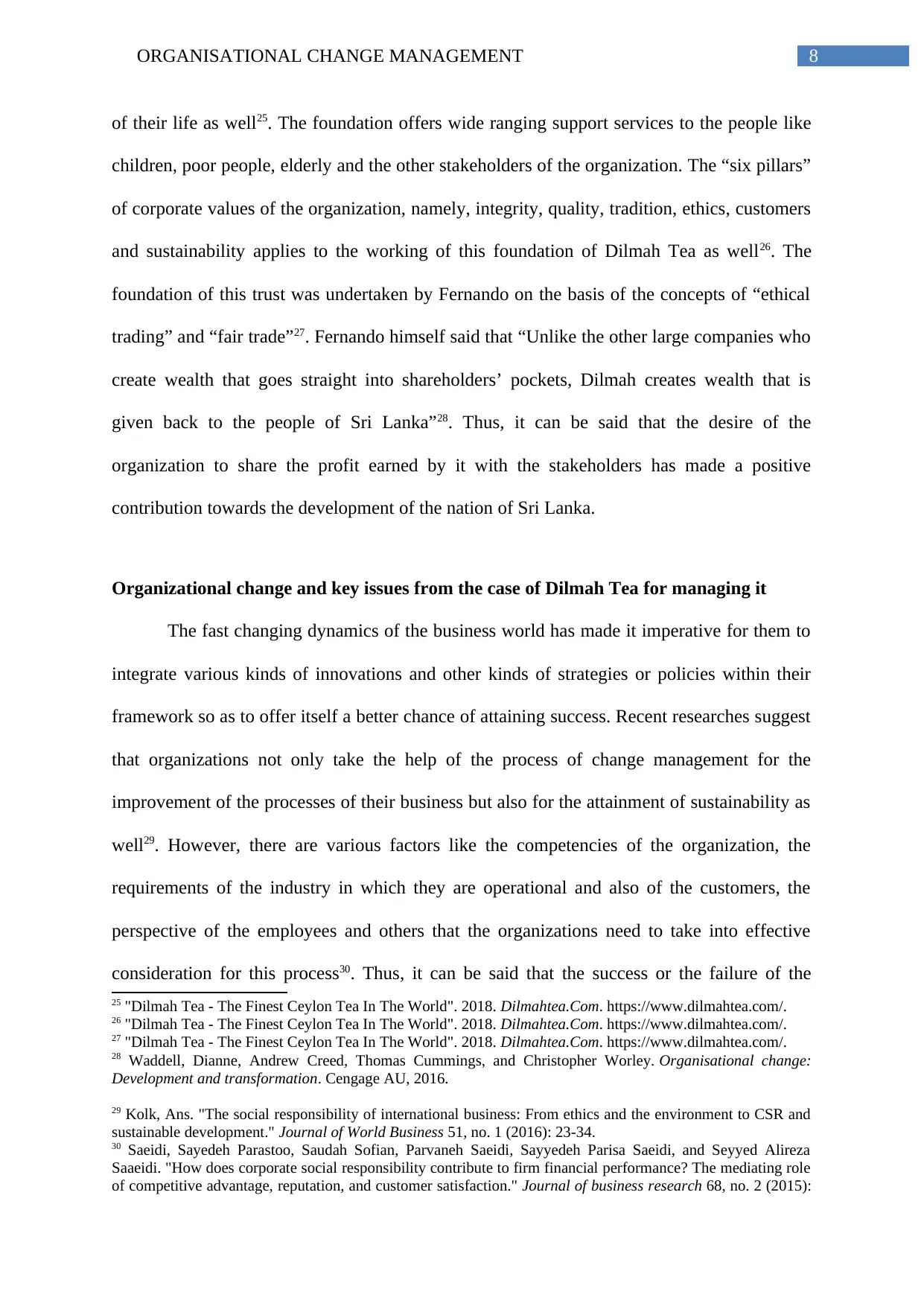
8ORGANISATIONAL CHANGE MANAGEMENT
of their life as well25. The foundation offers wide ranging support services to the people like
children, poor people, elderly and the other stakeholders of the organization. The “six pillars”
of corporate values of the organization, namely, integrity, quality, tradition, ethics, customers
and sustainability applies to the working of this foundation of Dilmah Tea as well26. The
foundation of this trust was undertaken by Fernando on the basis of the concepts of “ethical
trading” and “fair trade”27. Fernando himself said that “Unlike the other large companies who
create wealth that goes straight into shareholders’ pockets, Dilmah creates wealth that is
given back to the people of Sri Lanka”28. Thus, it can be said that the desire of the
organization to share the profit earned by it with the stakeholders has made a positive
contribution towards the development of the nation of Sri Lanka.
Organizational change and key issues from the case of Dilmah Tea for managing it
The fast changing dynamics of the business world has made it imperative for them to
integrate various kinds of innovations and other kinds of strategies or policies within their
framework so as to offer itself a better chance of attaining success. Recent researches suggest
that organizations not only take the help of the process of change management for the
improvement of the processes of their business but also for the attainment of sustainability as
well29. However, there are various factors like the competencies of the organization, the
requirements of the industry in which they are operational and also of the customers, the
perspective of the employees and others that the organizations need to take into effective
consideration for this process30. Thus, it can be said that the success or the failure of the
25 "Dilmah Tea - The Finest Ceylon Tea In The World". 2018. Dilmahtea.Com. https://www.dilmahtea.com/.
26 "Dilmah Tea - The Finest Ceylon Tea In The World". 2018. Dilmahtea.Com. https://www.dilmahtea.com/.
27 "Dilmah Tea - The Finest Ceylon Tea In The World". 2018. Dilmahtea.Com. https://www.dilmahtea.com/.
28 Waddell, Dianne, Andrew Creed, Thomas Cummings, and Christopher Worley. Organisational change:
Development and transformation. Cengage AU, 2016.
29 Kolk, Ans. "The social responsibility of international business: From ethics and the environment to CSR and
sustainable development." Journal of World Business 51, no. 1 (2016): 23-34.
30 Saeidi, Sayedeh Parastoo, Saudah Sofian, Parvaneh Saeidi, Sayyedeh Parisa Saeidi, and Seyyed Alireza
Saaeidi. "How does corporate social responsibility contribute to firm financial performance? The mediating role
of competitive advantage, reputation, and customer satisfaction." Journal of business research 68, no. 2 (2015):
of their life as well25. The foundation offers wide ranging support services to the people like
children, poor people, elderly and the other stakeholders of the organization. The “six pillars”
of corporate values of the organization, namely, integrity, quality, tradition, ethics, customers
and sustainability applies to the working of this foundation of Dilmah Tea as well26. The
foundation of this trust was undertaken by Fernando on the basis of the concepts of “ethical
trading” and “fair trade”27. Fernando himself said that “Unlike the other large companies who
create wealth that goes straight into shareholders’ pockets, Dilmah creates wealth that is
given back to the people of Sri Lanka”28. Thus, it can be said that the desire of the
organization to share the profit earned by it with the stakeholders has made a positive
contribution towards the development of the nation of Sri Lanka.
Organizational change and key issues from the case of Dilmah Tea for managing it
The fast changing dynamics of the business world has made it imperative for them to
integrate various kinds of innovations and other kinds of strategies or policies within their
framework so as to offer itself a better chance of attaining success. Recent researches suggest
that organizations not only take the help of the process of change management for the
improvement of the processes of their business but also for the attainment of sustainability as
well29. However, there are various factors like the competencies of the organization, the
requirements of the industry in which they are operational and also of the customers, the
perspective of the employees and others that the organizations need to take into effective
consideration for this process30. Thus, it can be said that the success or the failure of the
25 "Dilmah Tea - The Finest Ceylon Tea In The World". 2018. Dilmahtea.Com. https://www.dilmahtea.com/.
26 "Dilmah Tea - The Finest Ceylon Tea In The World". 2018. Dilmahtea.Com. https://www.dilmahtea.com/.
27 "Dilmah Tea - The Finest Ceylon Tea In The World". 2018. Dilmahtea.Com. https://www.dilmahtea.com/.
28 Waddell, Dianne, Andrew Creed, Thomas Cummings, and Christopher Worley. Organisational change:
Development and transformation. Cengage AU, 2016.
29 Kolk, Ans. "The social responsibility of international business: From ethics and the environment to CSR and
sustainable development." Journal of World Business 51, no. 1 (2016): 23-34.
30 Saeidi, Sayedeh Parastoo, Saudah Sofian, Parvaneh Saeidi, Sayyedeh Parisa Saeidi, and Seyyed Alireza
Saaeidi. "How does corporate social responsibility contribute to firm financial performance? The mediating role
of competitive advantage, reputation, and customer satisfaction." Journal of business research 68, no. 2 (2015):
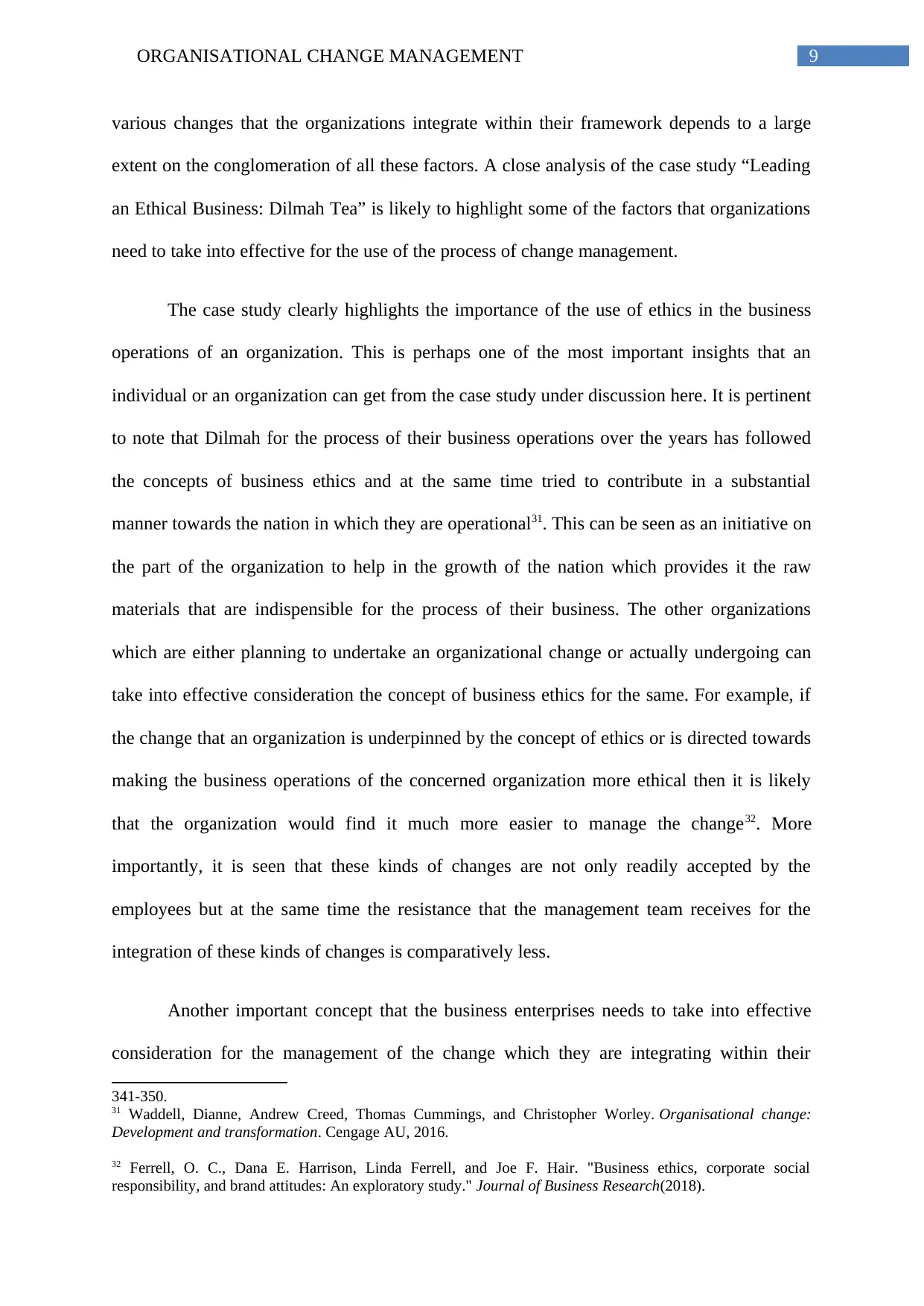
9ORGANISATIONAL CHANGE MANAGEMENT
various changes that the organizations integrate within their framework depends to a large
extent on the conglomeration of all these factors. A close analysis of the case study “Leading
an Ethical Business: Dilmah Tea” is likely to highlight some of the factors that organizations
need to take into effective for the use of the process of change management.
The case study clearly highlights the importance of the use of ethics in the business
operations of an organization. This is perhaps one of the most important insights that an
individual or an organization can get from the case study under discussion here. It is pertinent
to note that Dilmah for the process of their business operations over the years has followed
the concepts of business ethics and at the same time tried to contribute in a substantial
manner towards the nation in which they are operational31. This can be seen as an initiative on
the part of the organization to help in the growth of the nation which provides it the raw
materials that are indispensible for the process of their business. The other organizations
which are either planning to undertake an organizational change or actually undergoing can
take into effective consideration the concept of business ethics for the same. For example, if
the change that an organization is underpinned by the concept of ethics or is directed towards
making the business operations of the concerned organization more ethical then it is likely
that the organization would find it much more easier to manage the change32. More
importantly, it is seen that these kinds of changes are not only readily accepted by the
employees but at the same time the resistance that the management team receives for the
integration of these kinds of changes is comparatively less.
Another important concept that the business enterprises needs to take into effective
consideration for the management of the change which they are integrating within their
341-350.
31 Waddell, Dianne, Andrew Creed, Thomas Cummings, and Christopher Worley. Organisational change:
Development and transformation. Cengage AU, 2016.
32 Ferrell, O. C., Dana E. Harrison, Linda Ferrell, and Joe F. Hair. "Business ethics, corporate social
responsibility, and brand attitudes: An exploratory study." Journal of Business Research(2018).
various changes that the organizations integrate within their framework depends to a large
extent on the conglomeration of all these factors. A close analysis of the case study “Leading
an Ethical Business: Dilmah Tea” is likely to highlight some of the factors that organizations
need to take into effective for the use of the process of change management.
The case study clearly highlights the importance of the use of ethics in the business
operations of an organization. This is perhaps one of the most important insights that an
individual or an organization can get from the case study under discussion here. It is pertinent
to note that Dilmah for the process of their business operations over the years has followed
the concepts of business ethics and at the same time tried to contribute in a substantial
manner towards the nation in which they are operational31. This can be seen as an initiative on
the part of the organization to help in the growth of the nation which provides it the raw
materials that are indispensible for the process of their business. The other organizations
which are either planning to undertake an organizational change or actually undergoing can
take into effective consideration the concept of business ethics for the same. For example, if
the change that an organization is underpinned by the concept of ethics or is directed towards
making the business operations of the concerned organization more ethical then it is likely
that the organization would find it much more easier to manage the change32. More
importantly, it is seen that these kinds of changes are not only readily accepted by the
employees but at the same time the resistance that the management team receives for the
integration of these kinds of changes is comparatively less.
Another important concept that the business enterprises needs to take into effective
consideration for the management of the change which they are integrating within their
341-350.
31 Waddell, Dianne, Andrew Creed, Thomas Cummings, and Christopher Worley. Organisational change:
Development and transformation. Cengage AU, 2016.
32 Ferrell, O. C., Dana E. Harrison, Linda Ferrell, and Joe F. Hair. "Business ethics, corporate social
responsibility, and brand attitudes: An exploratory study." Journal of Business Research(2018).
Secure Best Marks with AI Grader
Need help grading? Try our AI Grader for instant feedback on your assignments.
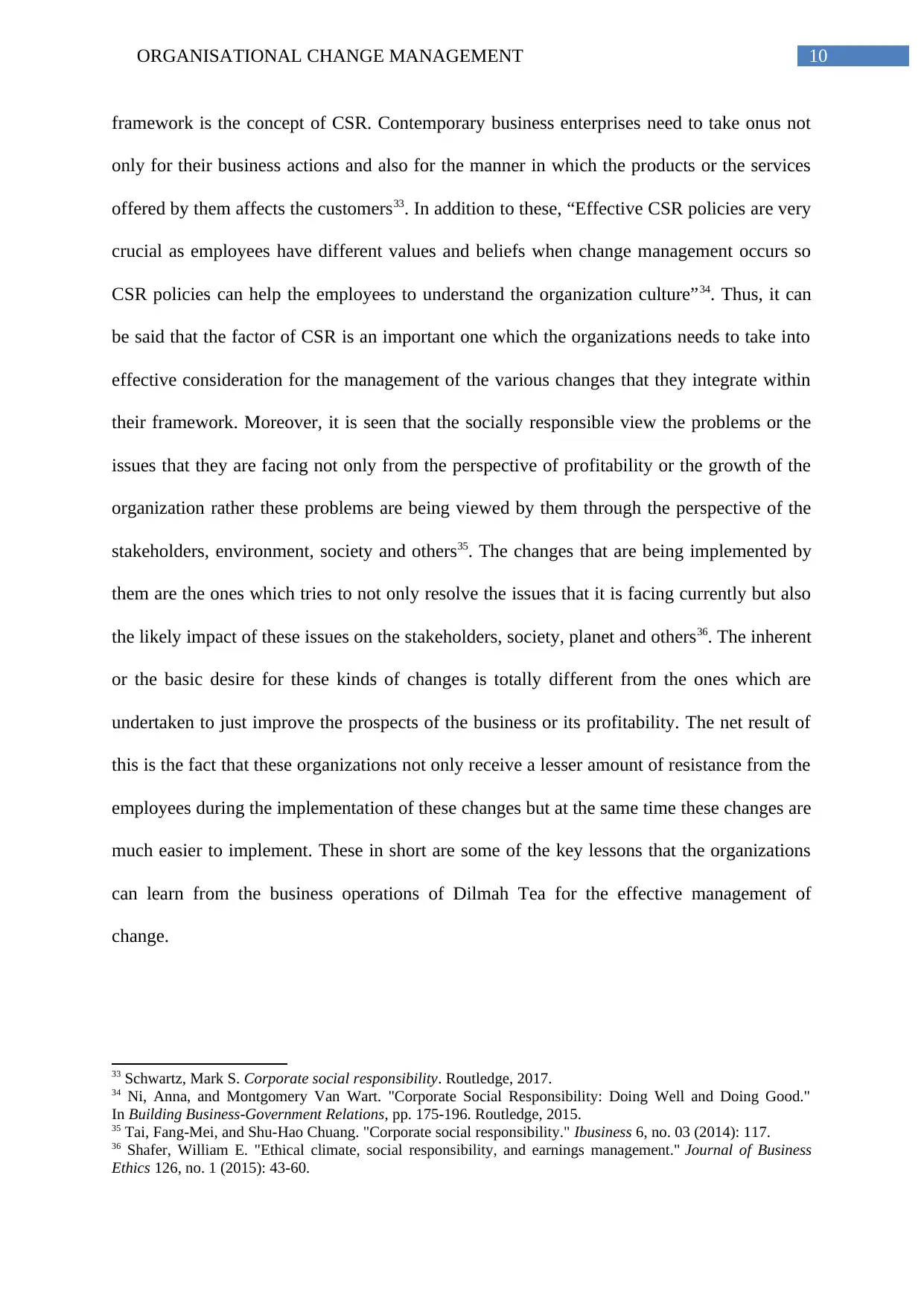
10ORGANISATIONAL CHANGE MANAGEMENT
framework is the concept of CSR. Contemporary business enterprises need to take onus not
only for their business actions and also for the manner in which the products or the services
offered by them affects the customers33. In addition to these, “Effective CSR policies are very
crucial as employees have different values and beliefs when change management occurs so
CSR policies can help the employees to understand the organization culture”34. Thus, it can
be said that the factor of CSR is an important one which the organizations needs to take into
effective consideration for the management of the various changes that they integrate within
their framework. Moreover, it is seen that the socially responsible view the problems or the
issues that they are facing not only from the perspective of profitability or the growth of the
organization rather these problems are being viewed by them through the perspective of the
stakeholders, environment, society and others35. The changes that are being implemented by
them are the ones which tries to not only resolve the issues that it is facing currently but also
the likely impact of these issues on the stakeholders, society, planet and others36. The inherent
or the basic desire for these kinds of changes is totally different from the ones which are
undertaken to just improve the prospects of the business or its profitability. The net result of
this is the fact that these organizations not only receive a lesser amount of resistance from the
employees during the implementation of these changes but at the same time these changes are
much easier to implement. These in short are some of the key lessons that the organizations
can learn from the business operations of Dilmah Tea for the effective management of
change.
33 Schwartz, Mark S. Corporate social responsibility. Routledge, 2017.
34 Ni, Anna, and Montgomery Van Wart. "Corporate Social Responsibility: Doing Well and Doing Good."
In Building Business-Government Relations, pp. 175-196. Routledge, 2015.
35 Tai, Fang-Mei, and Shu-Hao Chuang. "Corporate social responsibility." Ibusiness 6, no. 03 (2014): 117.
36 Shafer, William E. "Ethical climate, social responsibility, and earnings management." Journal of Business
Ethics 126, no. 1 (2015): 43-60.
framework is the concept of CSR. Contemporary business enterprises need to take onus not
only for their business actions and also for the manner in which the products or the services
offered by them affects the customers33. In addition to these, “Effective CSR policies are very
crucial as employees have different values and beliefs when change management occurs so
CSR policies can help the employees to understand the organization culture”34. Thus, it can
be said that the factor of CSR is an important one which the organizations needs to take into
effective consideration for the management of the various changes that they integrate within
their framework. Moreover, it is seen that the socially responsible view the problems or the
issues that they are facing not only from the perspective of profitability or the growth of the
organization rather these problems are being viewed by them through the perspective of the
stakeholders, environment, society and others35. The changes that are being implemented by
them are the ones which tries to not only resolve the issues that it is facing currently but also
the likely impact of these issues on the stakeholders, society, planet and others36. The inherent
or the basic desire for these kinds of changes is totally different from the ones which are
undertaken to just improve the prospects of the business or its profitability. The net result of
this is the fact that these organizations not only receive a lesser amount of resistance from the
employees during the implementation of these changes but at the same time these changes are
much easier to implement. These in short are some of the key lessons that the organizations
can learn from the business operations of Dilmah Tea for the effective management of
change.
33 Schwartz, Mark S. Corporate social responsibility. Routledge, 2017.
34 Ni, Anna, and Montgomery Van Wart. "Corporate Social Responsibility: Doing Well and Doing Good."
In Building Business-Government Relations, pp. 175-196. Routledge, 2015.
35 Tai, Fang-Mei, and Shu-Hao Chuang. "Corporate social responsibility." Ibusiness 6, no. 03 (2014): 117.
36 Shafer, William E. "Ethical climate, social responsibility, and earnings management." Journal of Business
Ethics 126, no. 1 (2015): 43-60.
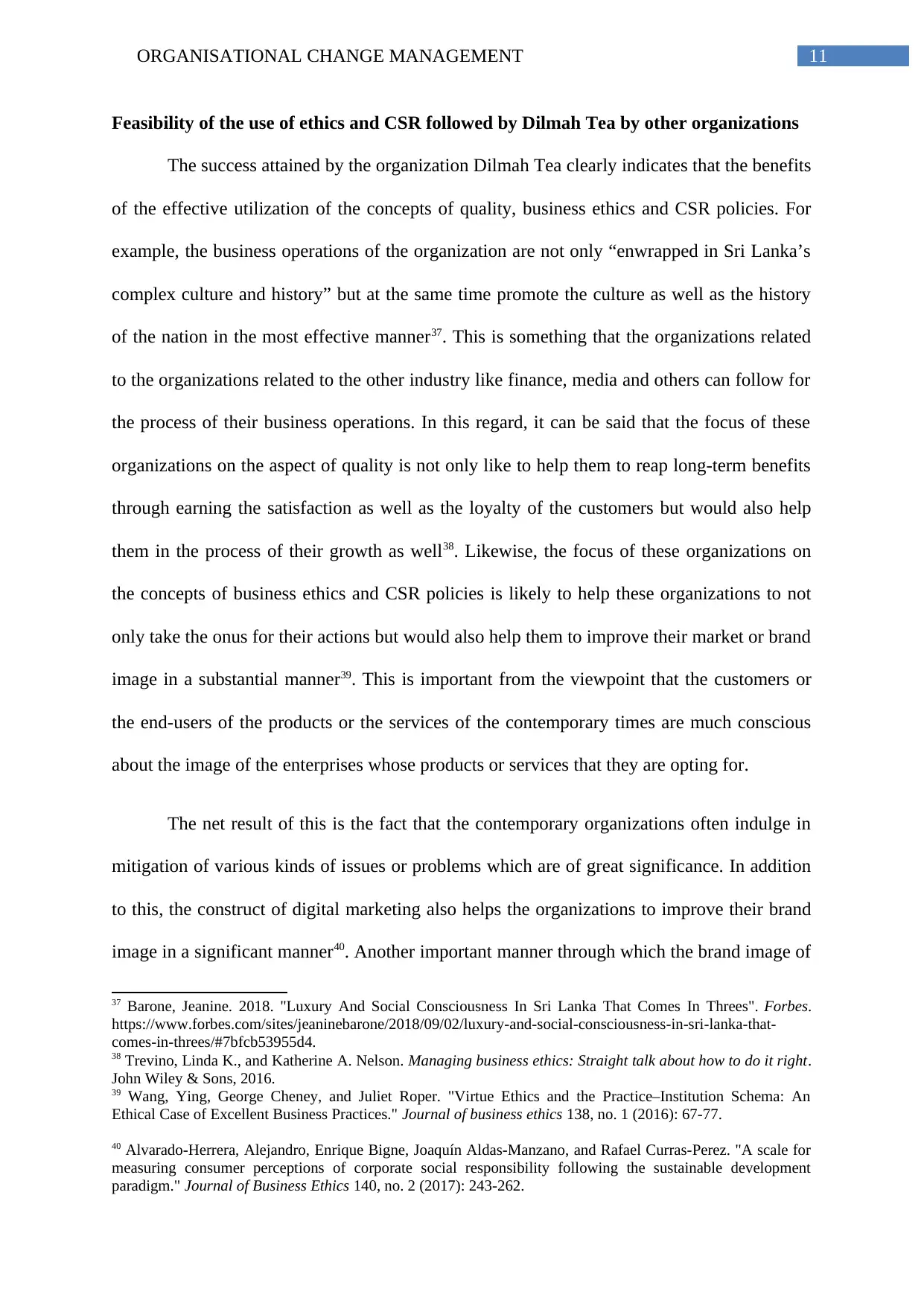
11ORGANISATIONAL CHANGE MANAGEMENT
Feasibility of the use of ethics and CSR followed by Dilmah Tea by other organizations
The success attained by the organization Dilmah Tea clearly indicates that the benefits
of the effective utilization of the concepts of quality, business ethics and CSR policies. For
example, the business operations of the organization are not only “enwrapped in Sri Lanka’s
complex culture and history” but at the same time promote the culture as well as the history
of the nation in the most effective manner37. This is something that the organizations related
to the organizations related to the other industry like finance, media and others can follow for
the process of their business operations. In this regard, it can be said that the focus of these
organizations on the aspect of quality is not only like to help them to reap long-term benefits
through earning the satisfaction as well as the loyalty of the customers but would also help
them in the process of their growth as well38. Likewise, the focus of these organizations on
the concepts of business ethics and CSR policies is likely to help these organizations to not
only take the onus for their actions but would also help them to improve their market or brand
image in a substantial manner39. This is important from the viewpoint that the customers or
the end-users of the products or the services of the contemporary times are much conscious
about the image of the enterprises whose products or services that they are opting for.
The net result of this is the fact that the contemporary organizations often indulge in
mitigation of various kinds of issues or problems which are of great significance. In addition
to this, the construct of digital marketing also helps the organizations to improve their brand
image in a significant manner40. Another important manner through which the brand image of
37 Barone, Jeanine. 2018. "Luxury And Social Consciousness In Sri Lanka That Comes In Threes". Forbes.
https://www.forbes.com/sites/jeaninebarone/2018/09/02/luxury-and-social-consciousness-in-sri-lanka-that-
comes-in-threes/#7bfcb53955d4.
38 Trevino, Linda K., and Katherine A. Nelson. Managing business ethics: Straight talk about how to do it right.
John Wiley & Sons, 2016.
39 Wang, Ying, George Cheney, and Juliet Roper. "Virtue Ethics and the Practice–Institution Schema: An
Ethical Case of Excellent Business Practices." Journal of business ethics 138, no. 1 (2016): 67-77.
40 Alvarado-Herrera, Alejandro, Enrique Bigne, Joaquín Aldas-Manzano, and Rafael Curras-Perez. "A scale for
measuring consumer perceptions of corporate social responsibility following the sustainable development
paradigm." Journal of Business Ethics 140, no. 2 (2017): 243-262.
Feasibility of the use of ethics and CSR followed by Dilmah Tea by other organizations
The success attained by the organization Dilmah Tea clearly indicates that the benefits
of the effective utilization of the concepts of quality, business ethics and CSR policies. For
example, the business operations of the organization are not only “enwrapped in Sri Lanka’s
complex culture and history” but at the same time promote the culture as well as the history
of the nation in the most effective manner37. This is something that the organizations related
to the organizations related to the other industry like finance, media and others can follow for
the process of their business operations. In this regard, it can be said that the focus of these
organizations on the aspect of quality is not only like to help them to reap long-term benefits
through earning the satisfaction as well as the loyalty of the customers but would also help
them in the process of their growth as well38. Likewise, the focus of these organizations on
the concepts of business ethics and CSR policies is likely to help these organizations to not
only take the onus for their actions but would also help them to improve their market or brand
image in a substantial manner39. This is important from the viewpoint that the customers or
the end-users of the products or the services of the contemporary times are much conscious
about the image of the enterprises whose products or services that they are opting for.
The net result of this is the fact that the contemporary organizations often indulge in
mitigation of various kinds of issues or problems which are of great significance. In addition
to this, the construct of digital marketing also helps the organizations to improve their brand
image in a significant manner40. Another important manner through which the brand image of
37 Barone, Jeanine. 2018. "Luxury And Social Consciousness In Sri Lanka That Comes In Threes". Forbes.
https://www.forbes.com/sites/jeaninebarone/2018/09/02/luxury-and-social-consciousness-in-sri-lanka-that-
comes-in-threes/#7bfcb53955d4.
38 Trevino, Linda K., and Katherine A. Nelson. Managing business ethics: Straight talk about how to do it right.
John Wiley & Sons, 2016.
39 Wang, Ying, George Cheney, and Juliet Roper. "Virtue Ethics and the Practice–Institution Schema: An
Ethical Case of Excellent Business Practices." Journal of business ethics 138, no. 1 (2016): 67-77.
40 Alvarado-Herrera, Alejandro, Enrique Bigne, Joaquín Aldas-Manzano, and Rafael Curras-Perez. "A scale for
measuring consumer perceptions of corporate social responsibility following the sustainable development
paradigm." Journal of Business Ethics 140, no. 2 (2017): 243-262.
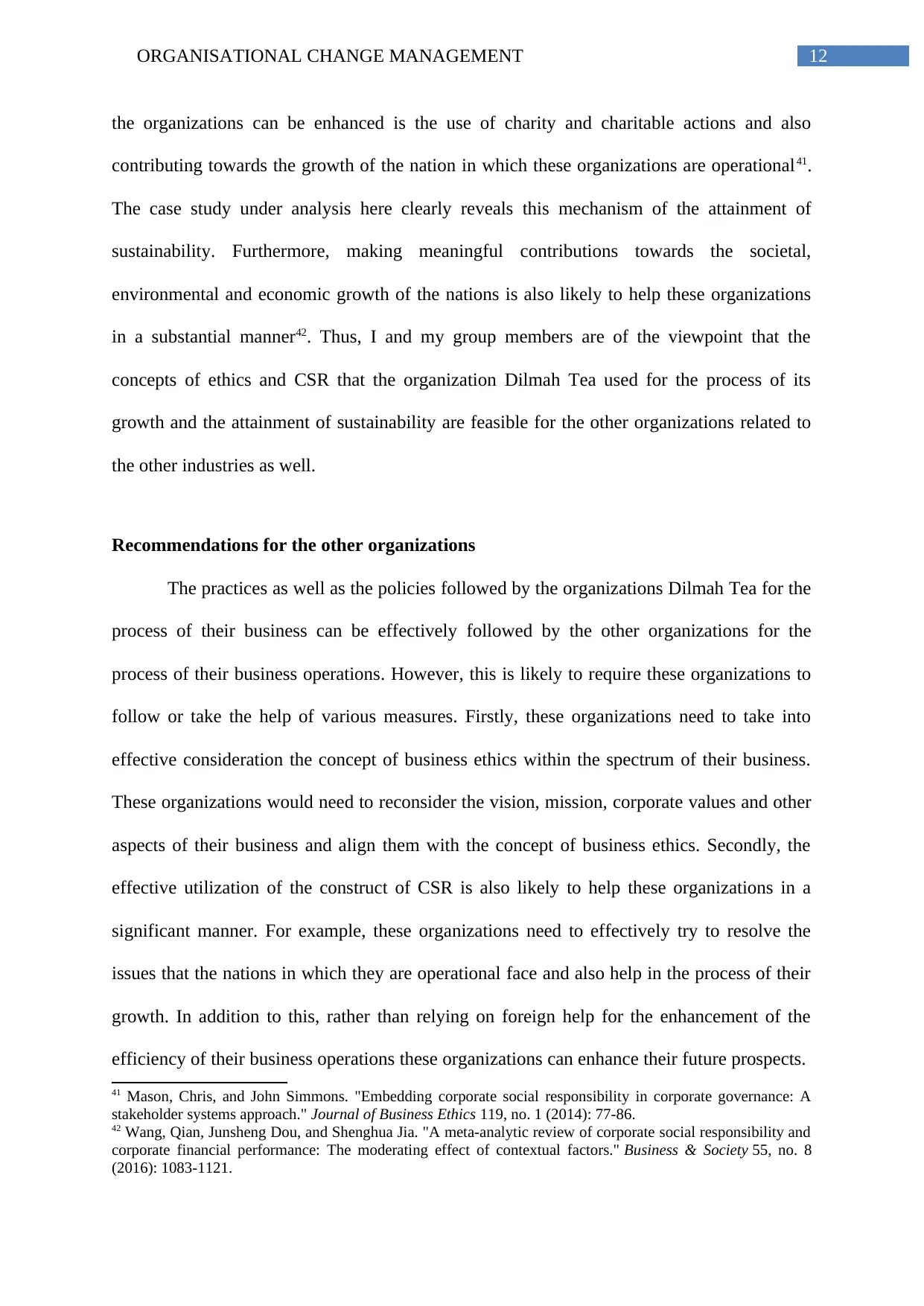
12ORGANISATIONAL CHANGE MANAGEMENT
the organizations can be enhanced is the use of charity and charitable actions and also
contributing towards the growth of the nation in which these organizations are operational41.
The case study under analysis here clearly reveals this mechanism of the attainment of
sustainability. Furthermore, making meaningful contributions towards the societal,
environmental and economic growth of the nations is also likely to help these organizations
in a substantial manner42. Thus, I and my group members are of the viewpoint that the
concepts of ethics and CSR that the organization Dilmah Tea used for the process of its
growth and the attainment of sustainability are feasible for the other organizations related to
the other industries as well.
Recommendations for the other organizations
The practices as well as the policies followed by the organizations Dilmah Tea for the
process of their business can be effectively followed by the other organizations for the
process of their business operations. However, this is likely to require these organizations to
follow or take the help of various measures. Firstly, these organizations need to take into
effective consideration the concept of business ethics within the spectrum of their business.
These organizations would need to reconsider the vision, mission, corporate values and other
aspects of their business and align them with the concept of business ethics. Secondly, the
effective utilization of the construct of CSR is also likely to help these organizations in a
significant manner. For example, these organizations need to effectively try to resolve the
issues that the nations in which they are operational face and also help in the process of their
growth. In addition to this, rather than relying on foreign help for the enhancement of the
efficiency of their business operations these organizations can enhance their future prospects.
41 Mason, Chris, and John Simmons. "Embedding corporate social responsibility in corporate governance: A
stakeholder systems approach." Journal of Business Ethics 119, no. 1 (2014): 77-86.
42 Wang, Qian, Junsheng Dou, and Shenghua Jia. "A meta-analytic review of corporate social responsibility and
corporate financial performance: The moderating effect of contextual factors." Business & Society 55, no. 8
(2016): 1083-1121.
the organizations can be enhanced is the use of charity and charitable actions and also
contributing towards the growth of the nation in which these organizations are operational41.
The case study under analysis here clearly reveals this mechanism of the attainment of
sustainability. Furthermore, making meaningful contributions towards the societal,
environmental and economic growth of the nations is also likely to help these organizations
in a substantial manner42. Thus, I and my group members are of the viewpoint that the
concepts of ethics and CSR that the organization Dilmah Tea used for the process of its
growth and the attainment of sustainability are feasible for the other organizations related to
the other industries as well.
Recommendations for the other organizations
The practices as well as the policies followed by the organizations Dilmah Tea for the
process of their business can be effectively followed by the other organizations for the
process of their business operations. However, this is likely to require these organizations to
follow or take the help of various measures. Firstly, these organizations need to take into
effective consideration the concept of business ethics within the spectrum of their business.
These organizations would need to reconsider the vision, mission, corporate values and other
aspects of their business and align them with the concept of business ethics. Secondly, the
effective utilization of the construct of CSR is also likely to help these organizations in a
significant manner. For example, these organizations need to effectively try to resolve the
issues that the nations in which they are operational face and also help in the process of their
growth. In addition to this, rather than relying on foreign help for the enhancement of the
efficiency of their business operations these organizations can enhance their future prospects.
41 Mason, Chris, and John Simmons. "Embedding corporate social responsibility in corporate governance: A
stakeholder systems approach." Journal of Business Ethics 119, no. 1 (2014): 77-86.
42 Wang, Qian, Junsheng Dou, and Shenghua Jia. "A meta-analytic review of corporate social responsibility and
corporate financial performance: The moderating effect of contextual factors." Business & Society 55, no. 8
(2016): 1083-1121.
Paraphrase This Document
Need a fresh take? Get an instant paraphrase of this document with our AI Paraphraser
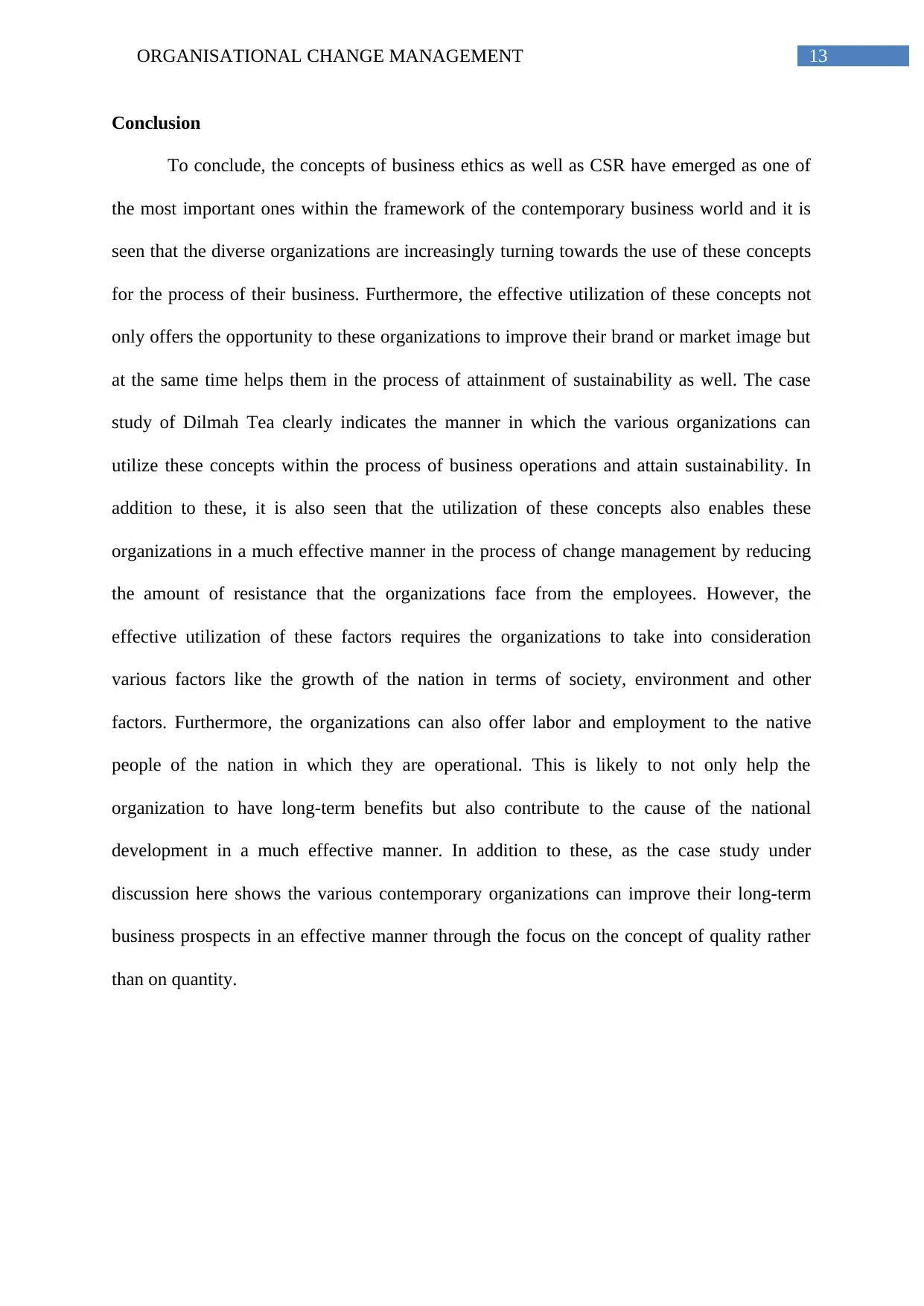
13ORGANISATIONAL CHANGE MANAGEMENT
Conclusion
To conclude, the concepts of business ethics as well as CSR have emerged as one of
the most important ones within the framework of the contemporary business world and it is
seen that the diverse organizations are increasingly turning towards the use of these concepts
for the process of their business. Furthermore, the effective utilization of these concepts not
only offers the opportunity to these organizations to improve their brand or market image but
at the same time helps them in the process of attainment of sustainability as well. The case
study of Dilmah Tea clearly indicates the manner in which the various organizations can
utilize these concepts within the process of business operations and attain sustainability. In
addition to these, it is also seen that the utilization of these concepts also enables these
organizations in a much effective manner in the process of change management by reducing
the amount of resistance that the organizations face from the employees. However, the
effective utilization of these factors requires the organizations to take into consideration
various factors like the growth of the nation in terms of society, environment and other
factors. Furthermore, the organizations can also offer labor and employment to the native
people of the nation in which they are operational. This is likely to not only help the
organization to have long-term benefits but also contribute to the cause of the national
development in a much effective manner. In addition to these, as the case study under
discussion here shows the various contemporary organizations can improve their long-term
business prospects in an effective manner through the focus on the concept of quality rather
than on quantity.
Conclusion
To conclude, the concepts of business ethics as well as CSR have emerged as one of
the most important ones within the framework of the contemporary business world and it is
seen that the diverse organizations are increasingly turning towards the use of these concepts
for the process of their business. Furthermore, the effective utilization of these concepts not
only offers the opportunity to these organizations to improve their brand or market image but
at the same time helps them in the process of attainment of sustainability as well. The case
study of Dilmah Tea clearly indicates the manner in which the various organizations can
utilize these concepts within the process of business operations and attain sustainability. In
addition to these, it is also seen that the utilization of these concepts also enables these
organizations in a much effective manner in the process of change management by reducing
the amount of resistance that the organizations face from the employees. However, the
effective utilization of these factors requires the organizations to take into consideration
various factors like the growth of the nation in terms of society, environment and other
factors. Furthermore, the organizations can also offer labor and employment to the native
people of the nation in which they are operational. This is likely to not only help the
organization to have long-term benefits but also contribute to the cause of the national
development in a much effective manner. In addition to these, as the case study under
discussion here shows the various contemporary organizations can improve their long-term
business prospects in an effective manner through the focus on the concept of quality rather
than on quantity.
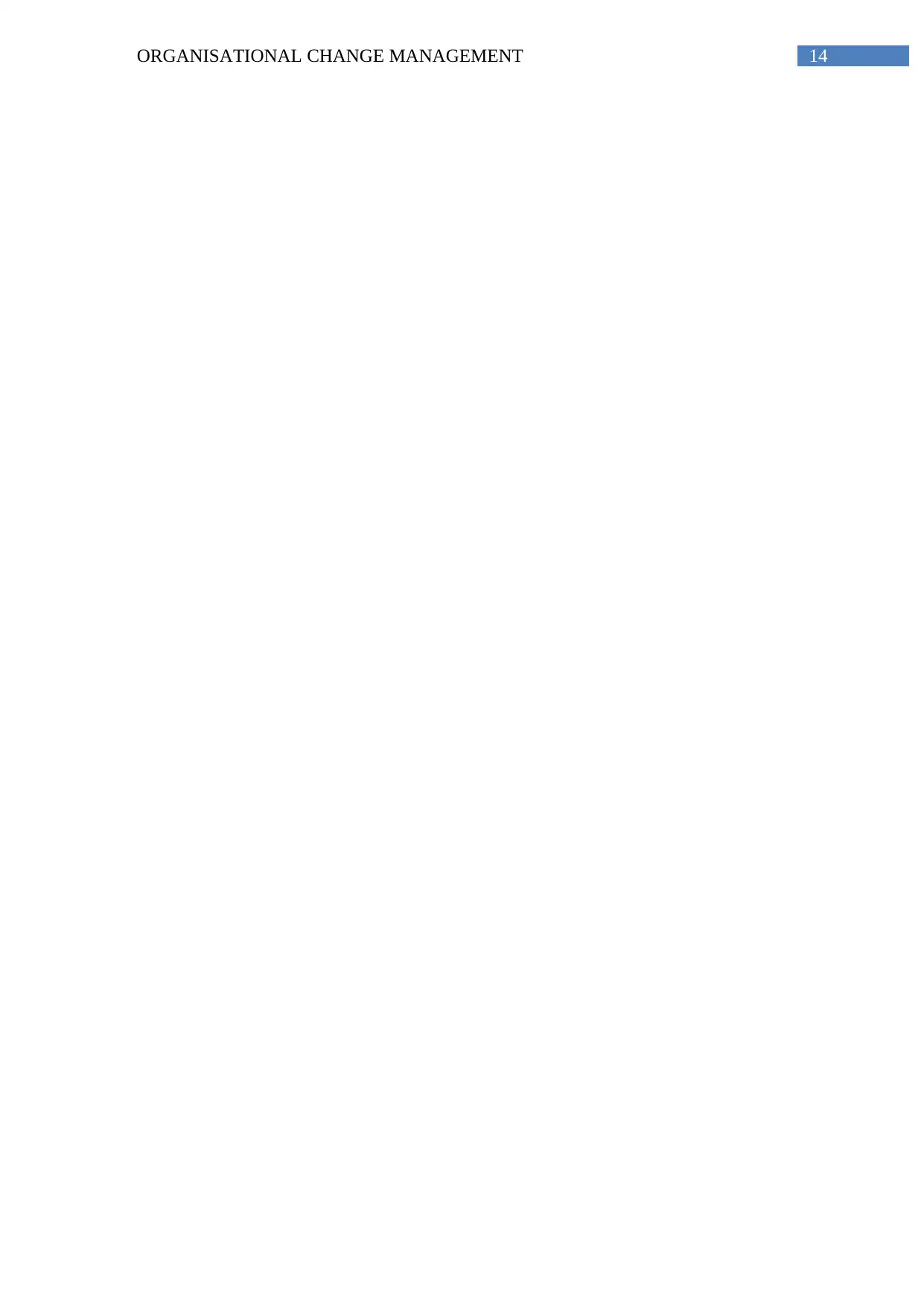
14ORGANISATIONAL CHANGE MANAGEMENT
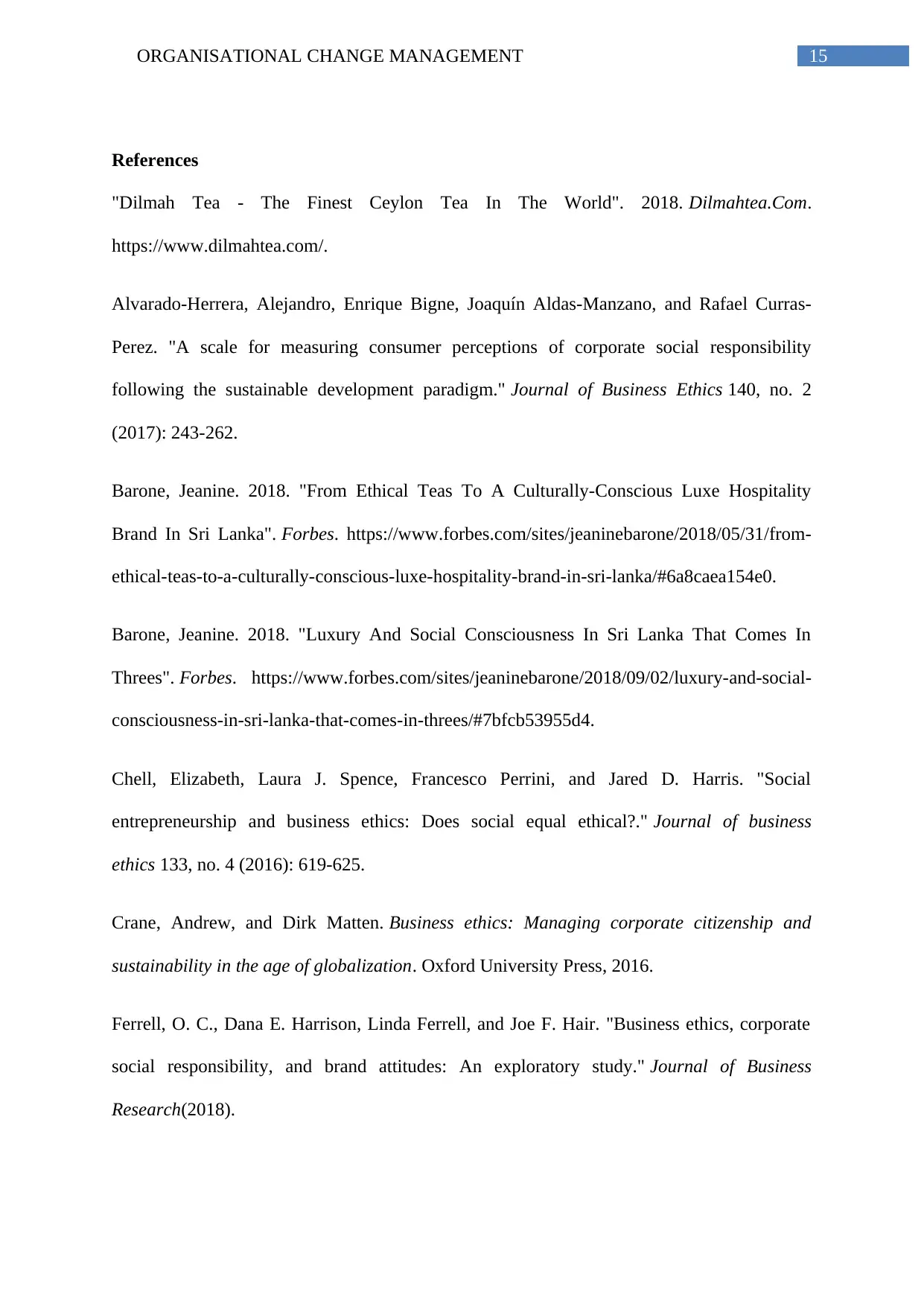
15ORGANISATIONAL CHANGE MANAGEMENT
References
"Dilmah Tea - The Finest Ceylon Tea In The World". 2018. Dilmahtea.Com.
https://www.dilmahtea.com/.
Alvarado-Herrera, Alejandro, Enrique Bigne, Joaquín Aldas-Manzano, and Rafael Curras-
Perez. "A scale for measuring consumer perceptions of corporate social responsibility
following the sustainable development paradigm." Journal of Business Ethics 140, no. 2
(2017): 243-262.
Barone, Jeanine. 2018. "From Ethical Teas To A Culturally-Conscious Luxe Hospitality
Brand In Sri Lanka". Forbes. https://www.forbes.com/sites/jeaninebarone/2018/05/31/from-
ethical-teas-to-a-culturally-conscious-luxe-hospitality-brand-in-sri-lanka/#6a8caea154e0.
Barone, Jeanine. 2018. "Luxury And Social Consciousness In Sri Lanka That Comes In
Threes". Forbes. https://www.forbes.com/sites/jeaninebarone/2018/09/02/luxury-and-social-
consciousness-in-sri-lanka-that-comes-in-threes/#7bfcb53955d4.
Chell, Elizabeth, Laura J. Spence, Francesco Perrini, and Jared D. Harris. "Social
entrepreneurship and business ethics: Does social equal ethical?." Journal of business
ethics 133, no. 4 (2016): 619-625.
Crane, Andrew, and Dirk Matten. Business ethics: Managing corporate citizenship and
sustainability in the age of globalization. Oxford University Press, 2016.
Ferrell, O. C., Dana E. Harrison, Linda Ferrell, and Joe F. Hair. "Business ethics, corporate
social responsibility, and brand attitudes: An exploratory study." Journal of Business
Research(2018).
References
"Dilmah Tea - The Finest Ceylon Tea In The World". 2018. Dilmahtea.Com.
https://www.dilmahtea.com/.
Alvarado-Herrera, Alejandro, Enrique Bigne, Joaquín Aldas-Manzano, and Rafael Curras-
Perez. "A scale for measuring consumer perceptions of corporate social responsibility
following the sustainable development paradigm." Journal of Business Ethics 140, no. 2
(2017): 243-262.
Barone, Jeanine. 2018. "From Ethical Teas To A Culturally-Conscious Luxe Hospitality
Brand In Sri Lanka". Forbes. https://www.forbes.com/sites/jeaninebarone/2018/05/31/from-
ethical-teas-to-a-culturally-conscious-luxe-hospitality-brand-in-sri-lanka/#6a8caea154e0.
Barone, Jeanine. 2018. "Luxury And Social Consciousness In Sri Lanka That Comes In
Threes". Forbes. https://www.forbes.com/sites/jeaninebarone/2018/09/02/luxury-and-social-
consciousness-in-sri-lanka-that-comes-in-threes/#7bfcb53955d4.
Chell, Elizabeth, Laura J. Spence, Francesco Perrini, and Jared D. Harris. "Social
entrepreneurship and business ethics: Does social equal ethical?." Journal of business
ethics 133, no. 4 (2016): 619-625.
Crane, Andrew, and Dirk Matten. Business ethics: Managing corporate citizenship and
sustainability in the age of globalization. Oxford University Press, 2016.
Ferrell, O. C., Dana E. Harrison, Linda Ferrell, and Joe F. Hair. "Business ethics, corporate
social responsibility, and brand attitudes: An exploratory study." Journal of Business
Research(2018).
Secure Best Marks with AI Grader
Need help grading? Try our AI Grader for instant feedback on your assignments.
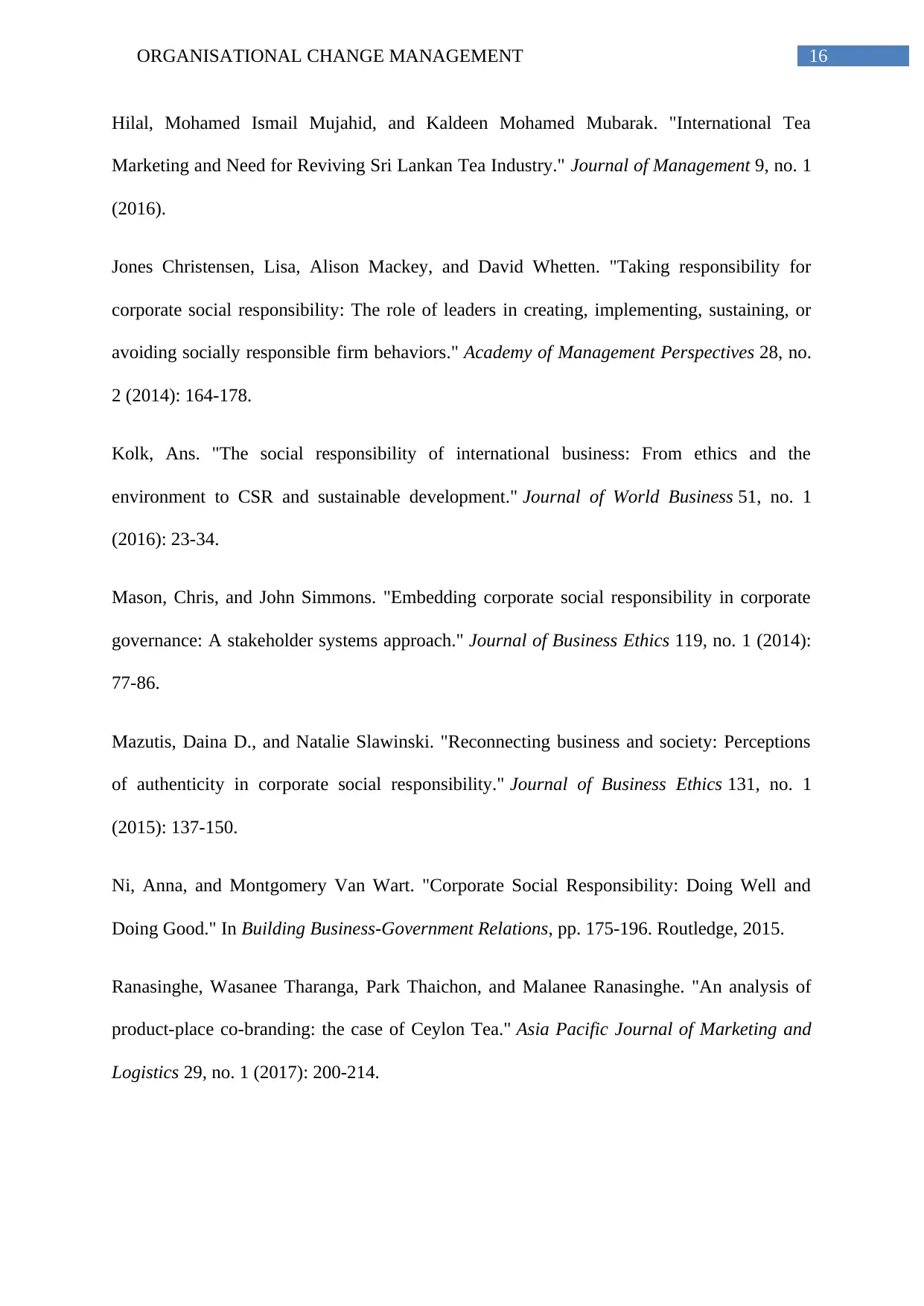
16ORGANISATIONAL CHANGE MANAGEMENT
Hilal, Mohamed Ismail Mujahid, and Kaldeen Mohamed Mubarak. "International Tea
Marketing and Need for Reviving Sri Lankan Tea Industry." Journal of Management 9, no. 1
(2016).
Jones Christensen, Lisa, Alison Mackey, and David Whetten. "Taking responsibility for
corporate social responsibility: The role of leaders in creating, implementing, sustaining, or
avoiding socially responsible firm behaviors." Academy of Management Perspectives 28, no.
2 (2014): 164-178.
Kolk, Ans. "The social responsibility of international business: From ethics and the
environment to CSR and sustainable development." Journal of World Business 51, no. 1
(2016): 23-34.
Mason, Chris, and John Simmons. "Embedding corporate social responsibility in corporate
governance: A stakeholder systems approach." Journal of Business Ethics 119, no. 1 (2014):
77-86.
Mazutis, Daina D., and Natalie Slawinski. "Reconnecting business and society: Perceptions
of authenticity in corporate social responsibility." Journal of Business Ethics 131, no. 1
(2015): 137-150.
Ni, Anna, and Montgomery Van Wart. "Corporate Social Responsibility: Doing Well and
Doing Good." In Building Business-Government Relations, pp. 175-196. Routledge, 2015.
Ranasinghe, Wasanee Tharanga, Park Thaichon, and Malanee Ranasinghe. "An analysis of
product-place co-branding: the case of Ceylon Tea." Asia Pacific Journal of Marketing and
Logistics 29, no. 1 (2017): 200-214.
Hilal, Mohamed Ismail Mujahid, and Kaldeen Mohamed Mubarak. "International Tea
Marketing and Need for Reviving Sri Lankan Tea Industry." Journal of Management 9, no. 1
(2016).
Jones Christensen, Lisa, Alison Mackey, and David Whetten. "Taking responsibility for
corporate social responsibility: The role of leaders in creating, implementing, sustaining, or
avoiding socially responsible firm behaviors." Academy of Management Perspectives 28, no.
2 (2014): 164-178.
Kolk, Ans. "The social responsibility of international business: From ethics and the
environment to CSR and sustainable development." Journal of World Business 51, no. 1
(2016): 23-34.
Mason, Chris, and John Simmons. "Embedding corporate social responsibility in corporate
governance: A stakeholder systems approach." Journal of Business Ethics 119, no. 1 (2014):
77-86.
Mazutis, Daina D., and Natalie Slawinski. "Reconnecting business and society: Perceptions
of authenticity in corporate social responsibility." Journal of Business Ethics 131, no. 1
(2015): 137-150.
Ni, Anna, and Montgomery Van Wart. "Corporate Social Responsibility: Doing Well and
Doing Good." In Building Business-Government Relations, pp. 175-196. Routledge, 2015.
Ranasinghe, Wasanee Tharanga, Park Thaichon, and Malanee Ranasinghe. "An analysis of
product-place co-branding: the case of Ceylon Tea." Asia Pacific Journal of Marketing and
Logistics 29, no. 1 (2017): 200-214.
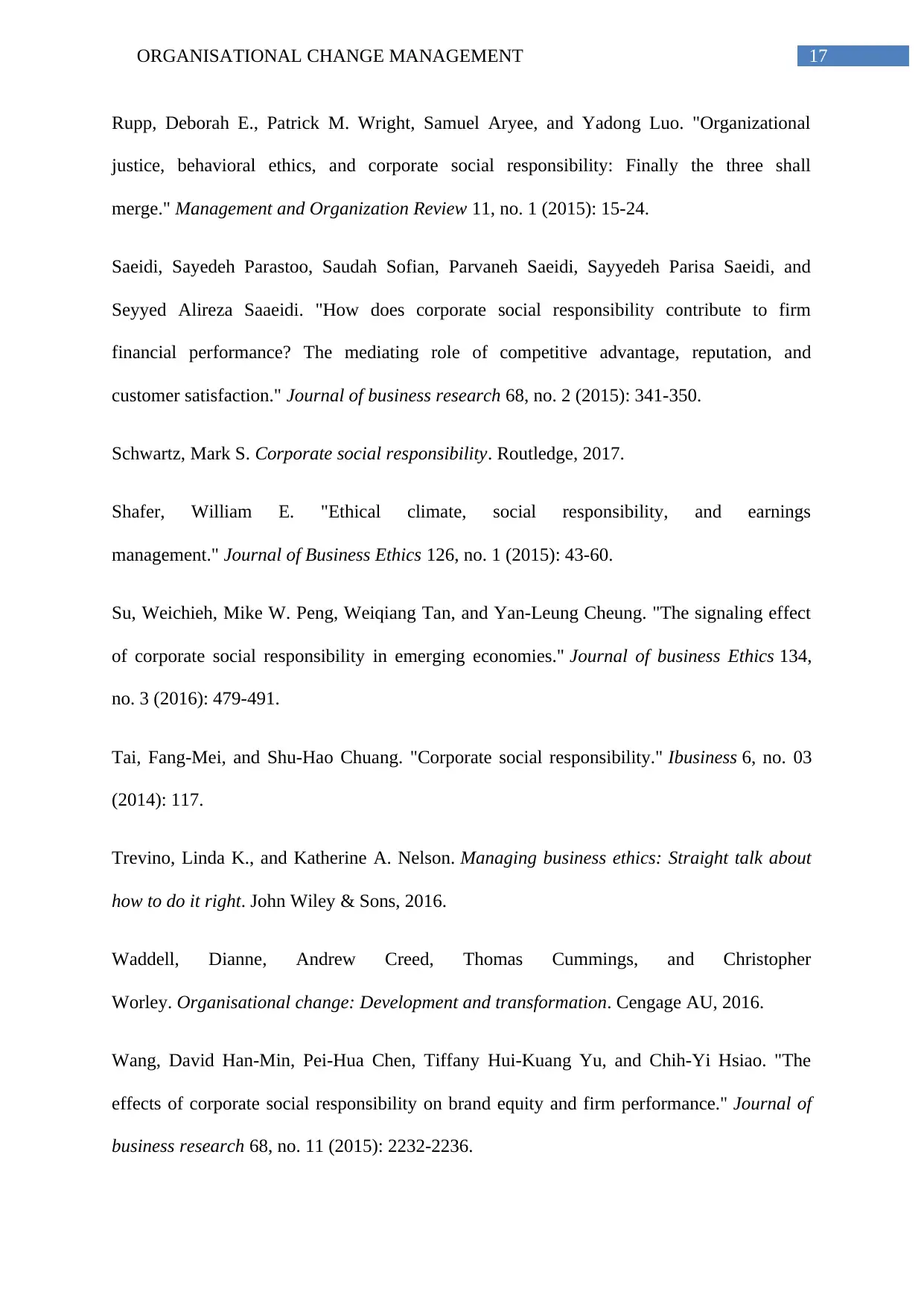
17ORGANISATIONAL CHANGE MANAGEMENT
Rupp, Deborah E., Patrick M. Wright, Samuel Aryee, and Yadong Luo. "Organizational
justice, behavioral ethics, and corporate social responsibility: Finally the three shall
merge." Management and Organization Review 11, no. 1 (2015): 15-24.
Saeidi, Sayedeh Parastoo, Saudah Sofian, Parvaneh Saeidi, Sayyedeh Parisa Saeidi, and
Seyyed Alireza Saaeidi. "How does corporate social responsibility contribute to firm
financial performance? The mediating role of competitive advantage, reputation, and
customer satisfaction." Journal of business research 68, no. 2 (2015): 341-350.
Schwartz, Mark S. Corporate social responsibility. Routledge, 2017.
Shafer, William E. "Ethical climate, social responsibility, and earnings
management." Journal of Business Ethics 126, no. 1 (2015): 43-60.
Su, Weichieh, Mike W. Peng, Weiqiang Tan, and Yan-Leung Cheung. "The signaling effect
of corporate social responsibility in emerging economies." Journal of business Ethics 134,
no. 3 (2016): 479-491.
Tai, Fang-Mei, and Shu-Hao Chuang. "Corporate social responsibility." Ibusiness 6, no. 03
(2014): 117.
Trevino, Linda K., and Katherine A. Nelson. Managing business ethics: Straight talk about
how to do it right. John Wiley & Sons, 2016.
Waddell, Dianne, Andrew Creed, Thomas Cummings, and Christopher
Worley. Organisational change: Development and transformation. Cengage AU, 2016.
Wang, David Han-Min, Pei-Hua Chen, Tiffany Hui-Kuang Yu, and Chih-Yi Hsiao. "The
effects of corporate social responsibility on brand equity and firm performance." Journal of
business research 68, no. 11 (2015): 2232-2236.
Rupp, Deborah E., Patrick M. Wright, Samuel Aryee, and Yadong Luo. "Organizational
justice, behavioral ethics, and corporate social responsibility: Finally the three shall
merge." Management and Organization Review 11, no. 1 (2015): 15-24.
Saeidi, Sayedeh Parastoo, Saudah Sofian, Parvaneh Saeidi, Sayyedeh Parisa Saeidi, and
Seyyed Alireza Saaeidi. "How does corporate social responsibility contribute to firm
financial performance? The mediating role of competitive advantage, reputation, and
customer satisfaction." Journal of business research 68, no. 2 (2015): 341-350.
Schwartz, Mark S. Corporate social responsibility. Routledge, 2017.
Shafer, William E. "Ethical climate, social responsibility, and earnings
management." Journal of Business Ethics 126, no. 1 (2015): 43-60.
Su, Weichieh, Mike W. Peng, Weiqiang Tan, and Yan-Leung Cheung. "The signaling effect
of corporate social responsibility in emerging economies." Journal of business Ethics 134,
no. 3 (2016): 479-491.
Tai, Fang-Mei, and Shu-Hao Chuang. "Corporate social responsibility." Ibusiness 6, no. 03
(2014): 117.
Trevino, Linda K., and Katherine A. Nelson. Managing business ethics: Straight talk about
how to do it right. John Wiley & Sons, 2016.
Waddell, Dianne, Andrew Creed, Thomas Cummings, and Christopher
Worley. Organisational change: Development and transformation. Cengage AU, 2016.
Wang, David Han-Min, Pei-Hua Chen, Tiffany Hui-Kuang Yu, and Chih-Yi Hsiao. "The
effects of corporate social responsibility on brand equity and firm performance." Journal of
business research 68, no. 11 (2015): 2232-2236.
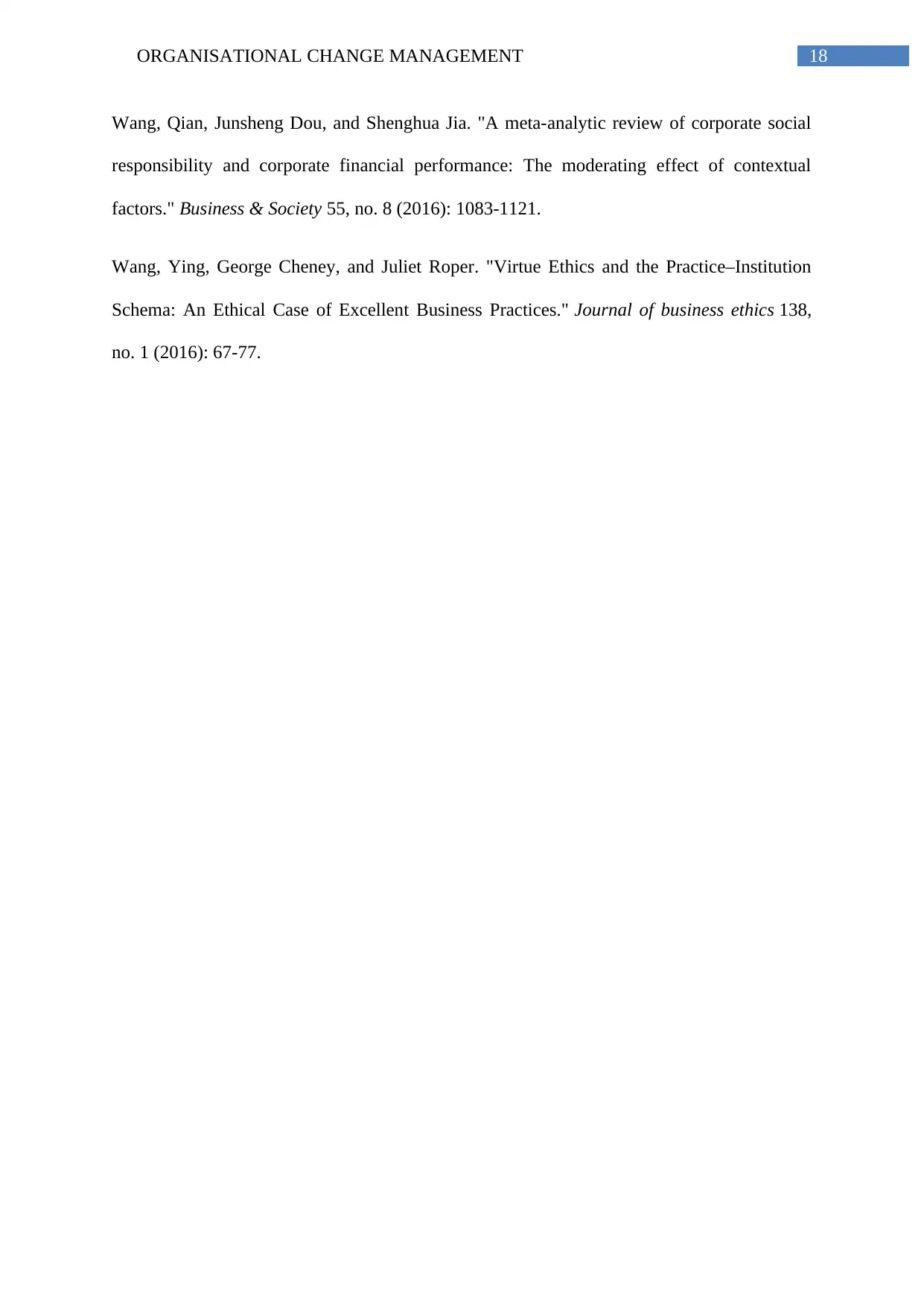
18ORGANISATIONAL CHANGE MANAGEMENT
Wang, Qian, Junsheng Dou, and Shenghua Jia. "A meta-analytic review of corporate social
responsibility and corporate financial performance: The moderating effect of contextual
factors." Business & Society 55, no. 8 (2016): 1083-1121.
Wang, Ying, George Cheney, and Juliet Roper. "Virtue Ethics and the Practice–Institution
Schema: An Ethical Case of Excellent Business Practices." Journal of business ethics 138,
no. 1 (2016): 67-77.
Wang, Qian, Junsheng Dou, and Shenghua Jia. "A meta-analytic review of corporate social
responsibility and corporate financial performance: The moderating effect of contextual
factors." Business & Society 55, no. 8 (2016): 1083-1121.
Wang, Ying, George Cheney, and Juliet Roper. "Virtue Ethics and the Practice–Institution
Schema: An Ethical Case of Excellent Business Practices." Journal of business ethics 138,
no. 1 (2016): 67-77.
1 out of 19
Related Documents
Your All-in-One AI-Powered Toolkit for Academic Success.
+13062052269
info@desklib.com
Available 24*7 on WhatsApp / Email
![[object Object]](/_next/static/media/star-bottom.7253800d.svg)
Unlock your academic potential
© 2024 | Zucol Services PVT LTD | All rights reserved.





